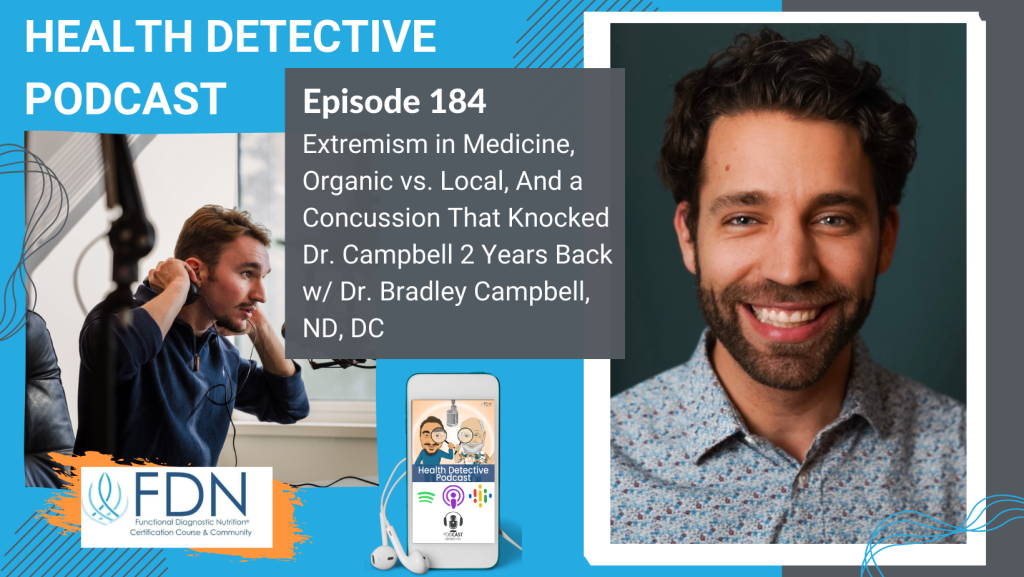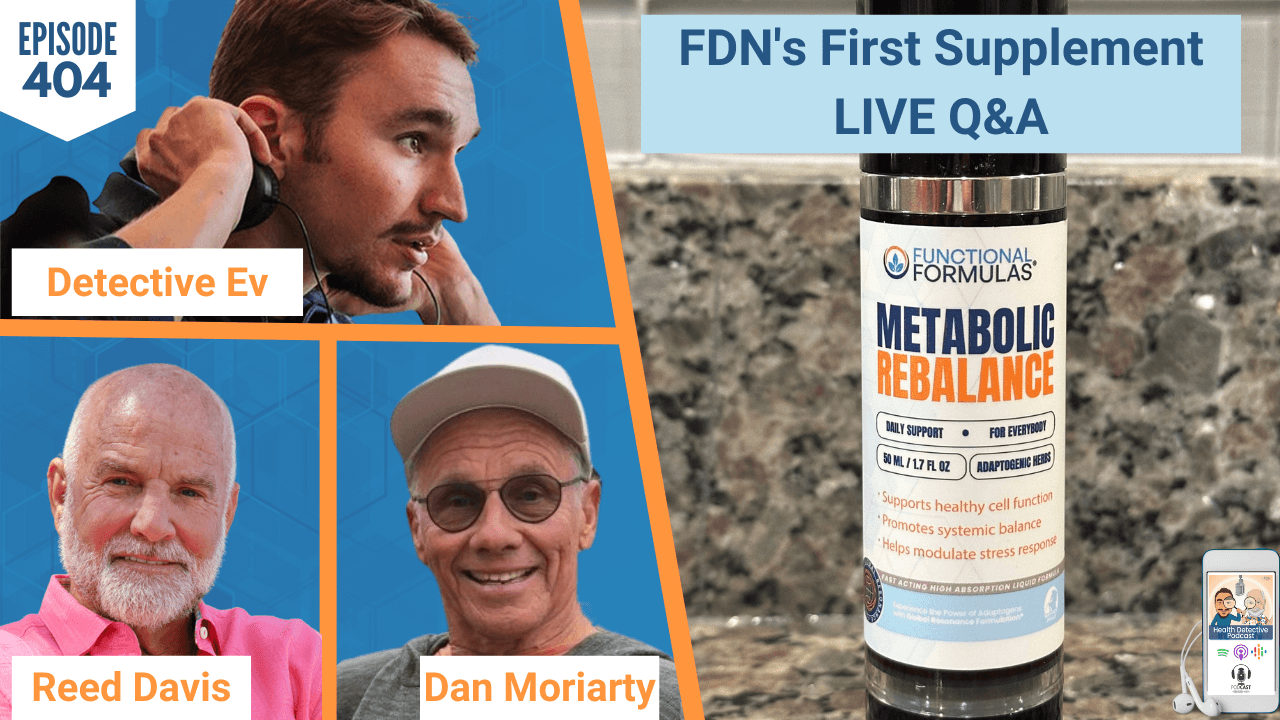Introduction
[00:00:00] Detective Ev: What is going on, my friends? Welcome back to another episode of the Health Detective Podcast by Functional Diagnostic Nutrition. My name is Evan Transue, aka Detective Ev. I will be your host for today’s show on extremism in medicine.
We have a special guest on today. It’s one of the most popular guests in terms of their social media presence that we have ever had on the show. His name is Dr. Bradley Campbell. Perhaps you follow him already, and if you do not, we would highly recommend that.
Of course, we will have his Instagram and other links in the show notes so that you can go give him a follow. He’s always dropping a ton of knowledge and just actual practical stuff. It’s not just a hype Instagram, there’s real things there. One of the coolest things that he does that I personally love is these morning drives in the convertible where he gives talks with his dog on his way to the office. You’re just going to have to go check those out to see what I mean. But again, they’re really cool.
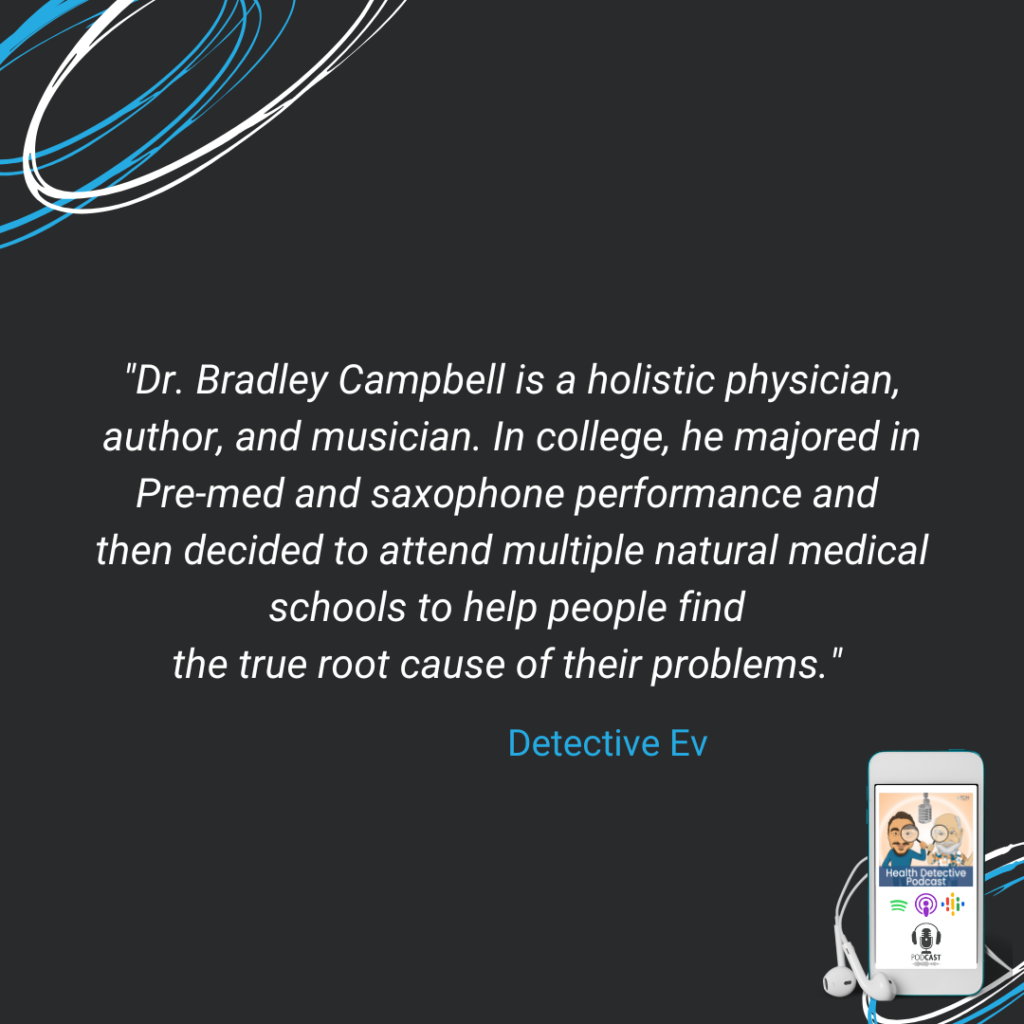
Dr. Bradley Campbell is a holistic physician, author, and musician. In college, he majored in Pre-med and saxophone performance and then decided to attend multiple natural medical schools to help people find the true root cause of their problems.
Dr. Campbell is currently working on completing 10 postgraduate degrees in natural healthcare. Aside from playing music, he enjoys traveling, water skiing, motorcycling, and spending time with his Irish setter, Elvis.
Two Interesting Health Experiences
This guy’s only 32 years old. The reason I say that is because when you hear how much he has already done with his life and what he’s currently doing, it’s kind of hard to believe that he did this all before the age of 40. It’s pretty impressive stuff.
What’s even cooler is not only does he help patients, but he does have his own story too. I say it that way because typically people on the show do have their own story. What I have found is if they are doctors that usually can go 50/50, sometimes they’re just doctors that got into the medical space to help others, like most doctors do. Then they transitioned eventually when they realized the system might not have been serving their clients.
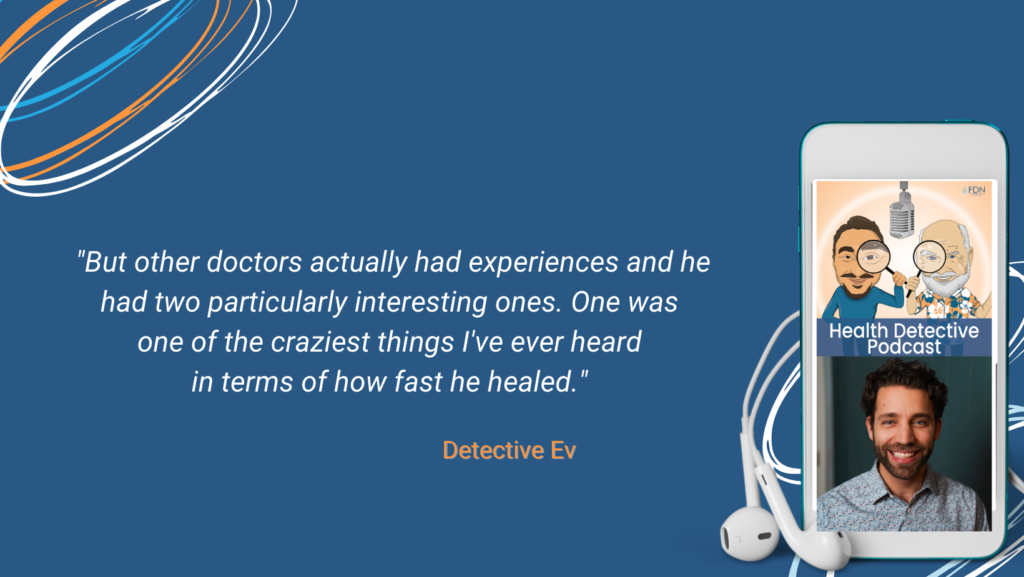
But other doctors actually had experiences and he had two particularly interesting ones. One was one of the craziest things I’ve ever heard in terms of how fast he healed. You guys will get to hear all of that and more in today’s episode.
Without further ado, let’s get to it.
All right. Hey there Dr. Campbell. Thanks so much for being here with us today.
Dr. Bradley Campbell: Thanks for having me on.
Detective Ev: This is a nice change of pace. Listen, you know how it is in the functional world, it’s like a very women dominated space. I love interviewing all these women, but it is very nice to have some, bearded men here today. Younger guys, testosterone flowing into this podcast. I mean, seriously, it is a little rarer that there is younger than not males in this space. So, it’s cool. I’m liking that we’re doing this.
Not Afraid to Speak Out
I don’t know about you, but I find that so many friends of mine from high school or the college-ish years, they’re really starting to feel the modern lifestyle now and the effects of it. Now they come to us. We were weird before, but now it’s pretty cool, isn’t it?
[00:03:02] Dr. Bradley Campbell: Yeah, they’re like, oh, you feel good? What’s that like?
[00:03:06] Detective Ev: Men start paying attention when a certain part of their life isn’t working so well. You know what I mean? Then they start asking you about the questions and stuff. But I will spare the audience of that detailed conversation.
I like to jump into this podcast pretty similarly in the same way with every single person to start off. I am fascinated by how people end up in this space especially when it is a male. Again, it’s not really the common route to take this more functional approach or challenge the system.

I love the stuff that you do on Instagram. I mean, you’re not afraid to say what you’re thinking. I think we need a lot more of this. How did you get into this type of space as opposed to just becoming any old doctor out there?
[00:03:44] Dr. Bradley Campbell: Well, I finished my chiropractic, naturopathic schools, and acupuncture school and then wasn’t sure what to do cause I was just studying super hard. So, I wrote a book.
Then after that I wasn’t sure what to do. So, I started a nonprofit right before the pandemic started. The nonprofit was going to be helping lower income people around the Chicago land area in the United States. Because of the pandemic, we couldn’t meet in person to treat people and to educate people.
Extremism in Medicine: Social Media Pushing Fear, Division, and Anger
So, I decided to go towards the online space and found that I could reach thousands more people online than I was ever able to reach in person. And it was a lot cheaper for me personally. I’ve still invested tons of my own money towards equipment and all those things that we have to do for podcasts or for other things, camera gear and video things.
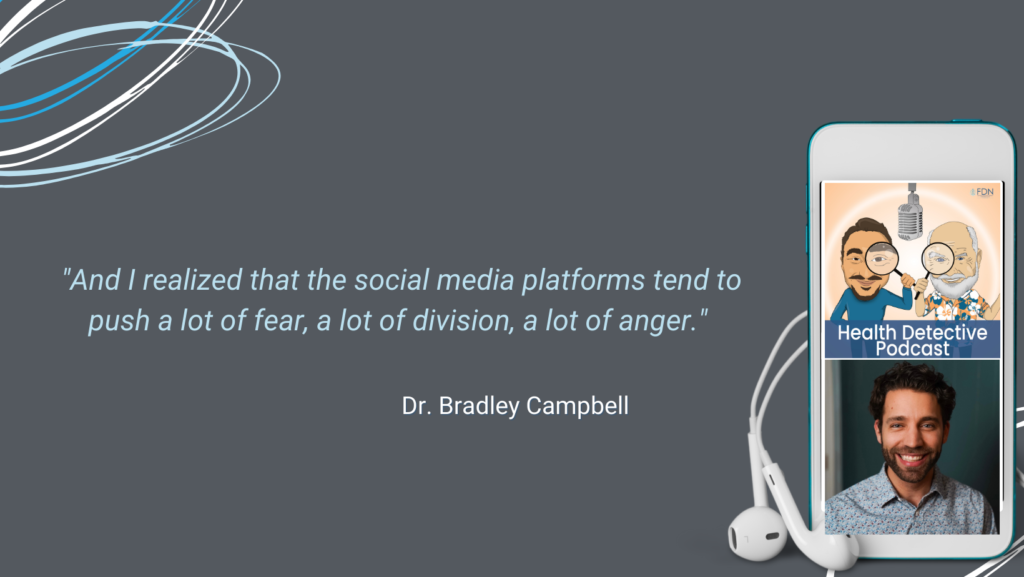
At the end of the day, what I realized is just that there was a lot of fear-based narratives going on in the online space. And I realized that the social media platforms tend to push a lot of fear, a lot of division, a lot of anger. Facebook has admitted this in recent years and people who have worked at Facebook, has said, yeah, the algorithm actually does do this.
Cause what they’re trying to do is just keep people on the platform as long as possible. The more they can emotionally trigger you, the more they can get you to comment on posts that are inflammatory. The more that their business succeeds, the more that they keep you on the platform. You have to be very mindful about what you surround yourself with.
But I was seeing a lot of my mentors either go super into team pandemic or like lockdown and take all the shots and do all the things and wear five masks. Then I had a bunch of other people, mentors of mine, who were going the opposite way, saying like, this is all BS. There is no such thing as the pandemic. This is all over hyped and they’re over counting the deaths and the shots are going to kill everybody who takes them within two years. Like, that’s totally not true.
Extremism in Medicine: It’s Easy to Become Dogmatic Against the System
I just saw a lot of misinformation on both sides and wanted to be a little bit of a voice of reason or moderation or calm hope for people to allow them the space to save their minds in a middle ground way that doesn’t have to be this polarizing, binary, inflammatory perspective.
[00:05:45] Detective Ev: I did not realize that was the motivation for you hopping online at all. Clearly, it’s working, and I think it’s being well received because people want this. I’ve never used those words, but this is something that we’re pushing at FDN in general, especially for our practitioners. Because you know how it is, it is very easy, especially for people like myself and like many of our practitioners who have been kind of messed up by Western medicine.

It failed us. Even if it was really good people behind it, the system still failed us. It’s very easy to become dogmatic and say, well, everything there is bad. I’m not going to trust anything.
And I completely agree with you on this. This isn’t something I’ve discussed on the show before, but I know they wouldn’t mind this. In the beginning of the pandemic, I was one of the more people like in my family who was extremely cautious about everything. Because it’s amazing how much ignorance can surround these topics.
Like they’re not caring about the masks, they’re not caring about washing their hands. I’m talking like a week or two in, Brad. I’m like, we don’t know anything about this, guys.
Extremism in Medicine: Most People Are in the Middle
Honestly, my prediction was, I thought it was a superbug, like an antibiotic resistant thing before we knew it was a virus. So, I’m like, wow, I’ve read about this. You know, we know it’s coming at some point, we just don’t know when. I’m thinking, guys, maybe you want to use a little extra soap today or something. Like, this isn’t really the thing to go against.
Then we have people, three years later, we’ve done just about everything you can. If you want the vaccine, they’re widely available. We’ve done every possible measure. The world’s pretty much open. And then, you know, you still have people on the other extreme end.
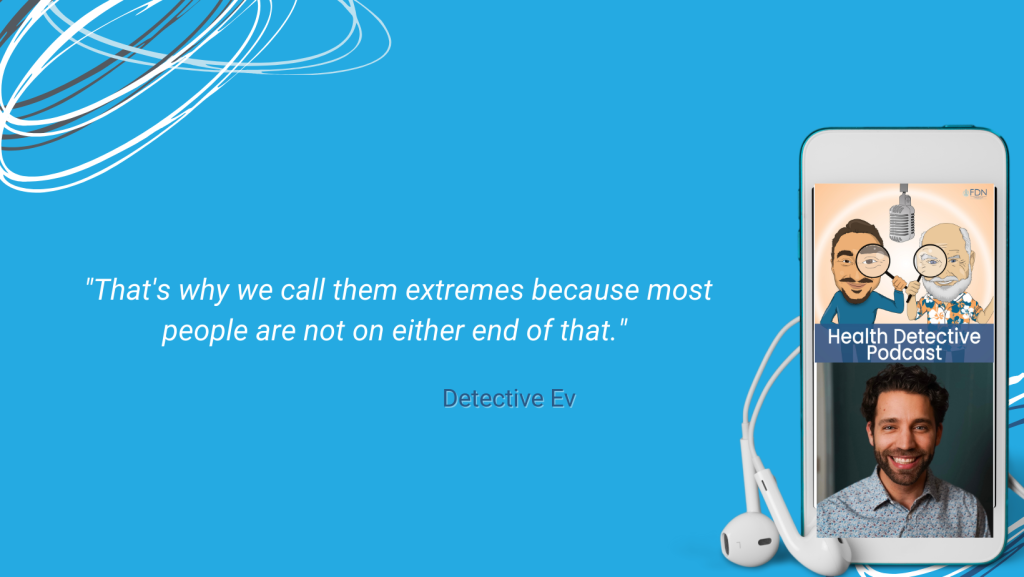
And I want to be very clear for those listening, that’s not a judgment, I’m just showing that I like to be somewhere in the middle of those two ends of the extremes. I think that’s exactly what you just described, and it’s probably why you’re taking off. Because most people are in the middle. That’s actually where they are. That’s why we call them extremes because most people are not on either end of that.
[00:07:22] Dr. Bradley Campbell: Correct. Yeah. It’s like most people don’t want to give every human on earth, every single shot that’s available to them, or they don’t want to give their child like six boosters. Right now, the uptake for children for the boosters is less than 2% because people are realizing what’s just admitted this week.
Finally, even though we knew this from reading the research before was that the shots don’t stop you from getting the infection. They’ve seen that in children.
Reserve the Lifesaving Protection for the Elderly

They’re like, well, if the kids got over it once or twice or three times and giving another shot isn’t going to help them not catch it again, why would I give it to the kid when you could save those things for the elderly, the people who really need some of that lifesaving protection there.
So, I think there’s a lot of gray in a world where the media and other people and social media likes to be very black and white, and people have appreciated that.
[00:08:10] Detective Ev: Well, yeah. We talk about following the science, which I’m very much an advocate for. I would imagine as a doctor you were for that as well. I don’t know many people that wouldn’t be for that. That’s the thing too, it’s like we get into this stage, and we know that kids, I mean, like you said, have virtually no risk of this.
This is not a serious thing for kids. I mean, you gotta be pretty sick, even by our standards, to get to a place where COVID could actually seriously affect a child. Maybe it’s changed a little recently, I do agree with that. But even six months ago, a year ago, we’re still taking extreme precautions for children.
I’m like, do you see children dropping dead on the street? I’m in schools a lot. I work in schools as well, and like they’re rubbing their faces. The funniest one ever, Dr. Campbell. I was doing a presentation in a school, and I laughed in the middle of it. I couldn’t hold it because this kid, it’s exactly what you expect from kids in schools using these masks.
Extremism in Medicine: People Wanted the Freedom to Choose
He has his blue mask on, but he was wearing it as a headband and had feathers out of it, like a Native American. I was like, oh yeah, this is preventing these kids from spreading COVID around. You know? I was like, good Lord man. It was the funniest thing ever.
But that’s the thing, it’s like these kids are obviously spreading it. Most of them are are completely fine. So, we should follow that science and not just the dogma promoted by the media one way or the other. That’s where I’m at with that for sure.
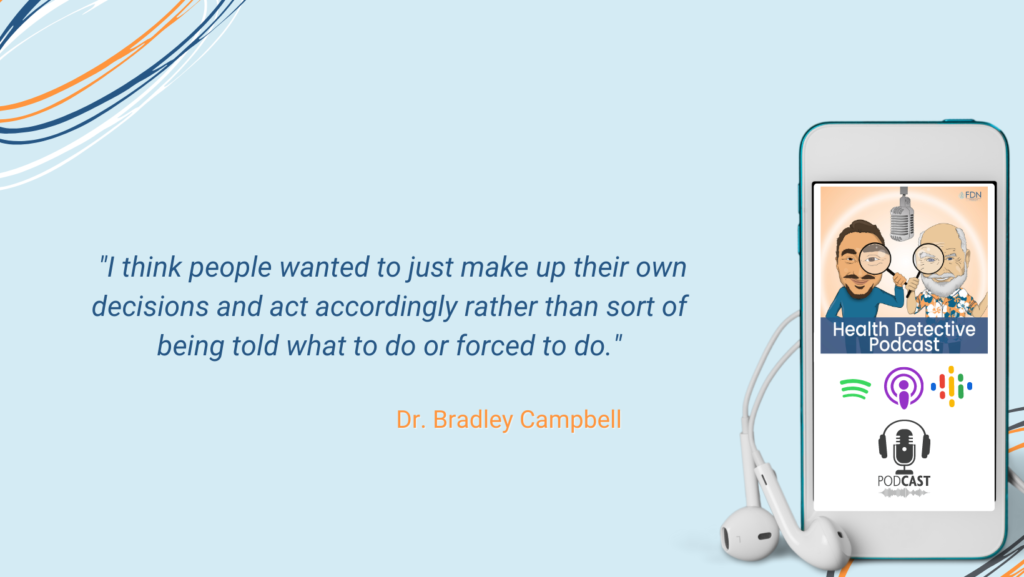
[00:09:19] Dr. Bradley Campbell: I think people wanted to just make up their own decisions and act accordingly rather than sort of being told what to do or forced to do.
[00:09:25] Detective Ev: Absolutely.
Now I want to rewind just even a little bit. Again, I’m truly really interested in people’s stories, that’s kind of my big thing. You said, you’re getting into chiropractic school, naturopathic medicine of all things. Again, these statistically are more female dominated spaces. Maybe not the chiropractor, I’m not sure, but I know for naturopathic physicians it is.
Did you experience your own health story or some type of other experience in your family?
I follow your stuff, but everyone knows this, that listens regularly. I go in with a healthy level of ignorance because I want to almost interact with you as a listener would, maybe they have no context.
So how did you even choose that path?
A Profound, Miraculous Event
[00:09:56] Dr. Bradley Campbell: I had a couple health issues that were problematic. One big one was a concussion when I was nine. I had nine months where my IQ dropped in half, my short-term memory was lost, and my personality was basically gone. Went from a grade ahead to a grade behind in school.

After nine months of seeing 30 plus doctors, I went to a chiropractor who found a dent in my head that was pushing on my brain. He did cranial work, which only a few chiropractors and osteopathic physicians know how to do. He basically pulled the dent out of my head, took the pressure off my brain, and within an hour I was completely back to my normal self. That was a profound, miraculous event.
Then in college I was doing saxophone performance and Pre-med at the same time, and I was getting really congested and sinusy, having tons of sinus infections and tonsil infections. I got my tonsils out. I had sinus surgery. I had three surgeries in a period of two years. I wasn’t really sure why that was happening.
I went to my doctor, I’m like, you know what, could food play a role in creating mucus, phlegm, or congestion? He’s like, no, food doesn’t do anything for your health. It’s just your genetics. You just have bad tonsils, and you just have allergies. There’s nothing you can really do about it.
You’re already taking allergy shots. So just do the surgeries, take these pills, and we’ll see you in three months. I was like, Okay, sure.
Extremism in Medicine: Modern Medicine Doesn’t Know Everything
Then one day I was like, you know what? He might not know everything. He’s a little arrogant and I’m not so sure I buy that.
So, I just Googled like what makes mucus, and first thing was like milk. I was like, Oh shoot. I’ve been having a quarter gallon of chocolate milk at 5:00 AM every day before I go play saxophone, and then creating an allergic response that then was making mucus in my sinuses.
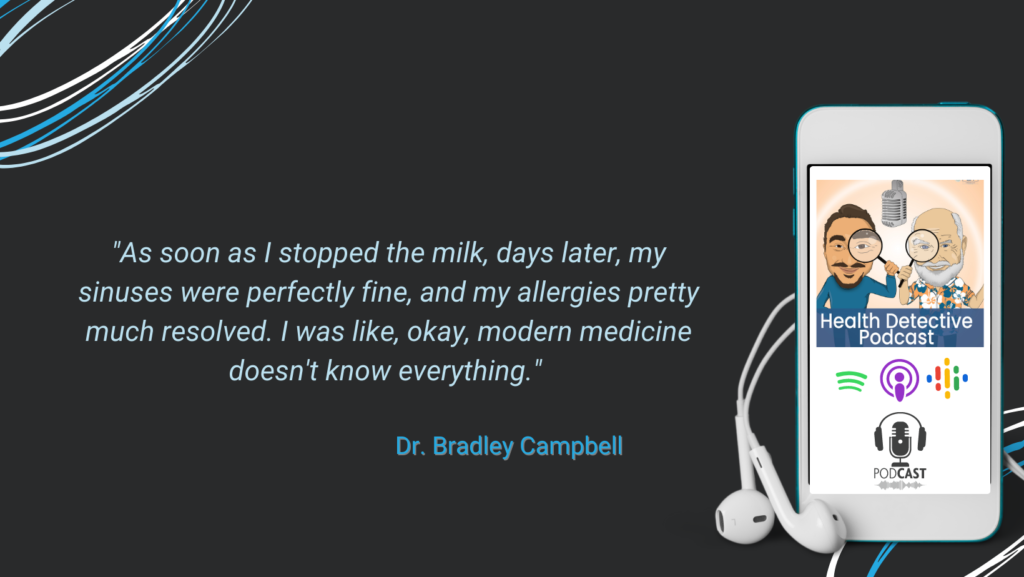
As soon as I stopped the milk, days later, my sinuses were perfectly fine, and my allergies pretty much resolved. I was like, okay, modern medicine doesn’t know everything. I didn’t realize that doctors don’t learn more than a few hours of nutrition in most medical schools.
So, I was pseudo gaslighted by my doctor, I guess at that point, just out of his own ignorance. He meant well, I believe, because that’s what he was taught. But I realized there was more towards healthcare than just being a medical doctor or a surgeon.
That’s when I decided not to go into Pre-med and to go more of the chiropractic, naturopathic route to really get to the root cause, do more nutrition, do more lifestyle medicine, and really help people heal and get healthy rather than just do drugs or surgery.
Even though I really liked the idea of doing surgery to help save people’s lives, I feel like I wanted to make a bigger impact and really get to the reason of why their chronic issues were going on.
A Soul Crushing Injury
[00:12:21] Detective Ev: So, you were always a smart guy, high achieving person.
To be clear with that grade thing, by the way, I know this might not have been the case for you, but let’s say normal for you would’ve been 10th grade, you were in 11th and the concussion pushed you back to like the ninth.
Dr. Bradley Campbell: Yep.
Detective Ev: Wow. Okay. That’s not fun.
[00:12:37] Dr. Bradley Campbell: No, it was pretty rough. I remember getting bullied for being the stupid kid, which was really weird for me.
[00:12:43] Detective Ev: Right. It’s not particularly easy to skip a grade. I mean, you probably had the exact opposite identity most of your life. Not that you were bullying, but that you were probably known as like a relatively smart person.

[00:12:53] Dr. Bradley Campbell: Yeah, exactly. Yeah, it was pretty soul crushing of an injury. My whole sense of self was blown up to bits, really.
[00:13:00] Detective Ev: So yeah, you’re taking the Pre-med path. I can understand now how this gets altered a little bit. You’ve already done it a few times, so I just want to emphasize it. Again, I think this is important whenever we’re talking to a decent audience size at this point.
I like that you say that your doctor pseudo gas lit you and that you still believe he’s a good person. It’s just so extreme when people start acting like all the Western medicine’s bad or they’re sitting on the fountain of youth.
Extremism in Medicine: Just Share the Truth
I always say that to them. I’m like, go look at the average doctor, seriously. Go to a family practice near you and you tell me if they even look like they’re sitting on the fountain of youth in their back office while giving you rat poison. It’s really humbling actually, in a sense.
You almost want to believe that it’s the doctors because it’d be easy. Oh, look at that problem. We can just stop using them and we’re all saved. It’s very humbling in a sense. When I fully accepted that at 18, because I mean, I had been sick for like 13 years before this so there was a long journey beforehand.
When I finally accepted this, I said, dang. This problem is so much bigger than I even realized. You know, I wish the problem was just my local doctor. This is way farther out than that. It gets really convoluted because you say, well, it’s the system. Well, what makes up the system? Overall, a lot of great, well-meaning people, who have just been taught things that might not be the best.
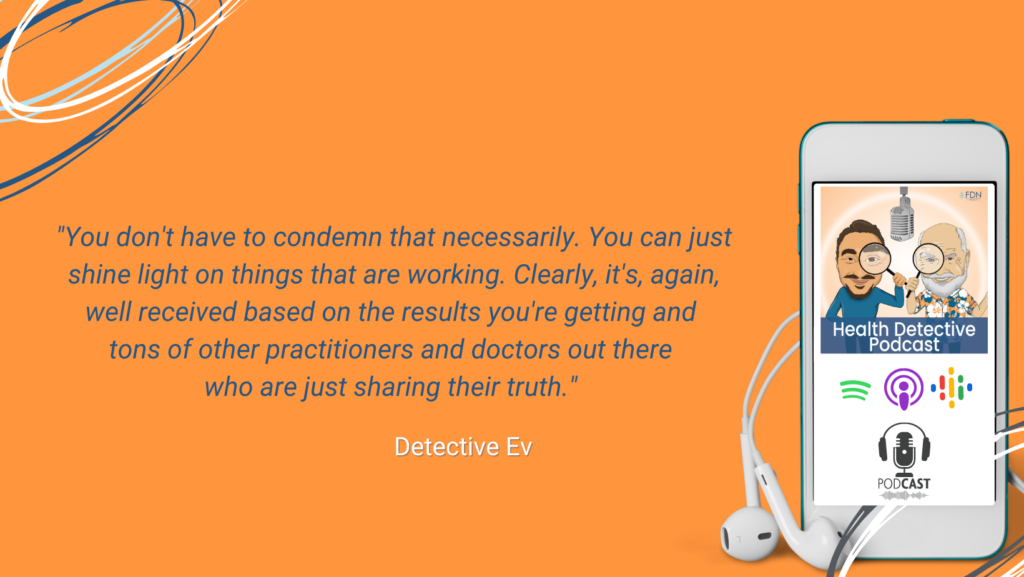
It’s like, who do you point the finger at? How do you stop it? I think one of the best ways, and this is why I do what I do, is podcasts like this, what you’re doing on Instagram. You don’t have to condemn that necessarily. You can just shine light on things that are working. Clearly, it’s, again, well received based on the results you’re getting and tons of other practitioners and doctors out there who are just sharing their truth.
This is what happened to me. This is what happened to people I know. People receive it very well, I think.
Extremism in Medicine: The Doctors Wish They Could Give Health
[00:14:36] Dr. Bradley Campbell: I mean, the system, some people are really pretty negative. Well, I’ve talked to many doctors. I’ve taught medical doctors at their med schools, actually, and on integrated medicine. They’ll say like, well, you know, diabetics, they’re just screwed.
They have no chance in the heck if they’re poor because the water is bad. The food quality is bad. It’s really cheap to buy a two liter for a dollar of Coca-Cola when Fiji water is going to be $5 for the same size. There’s a source in the tap water in Chicago, 30% of the tap water in Chicago is now tainted with lead.
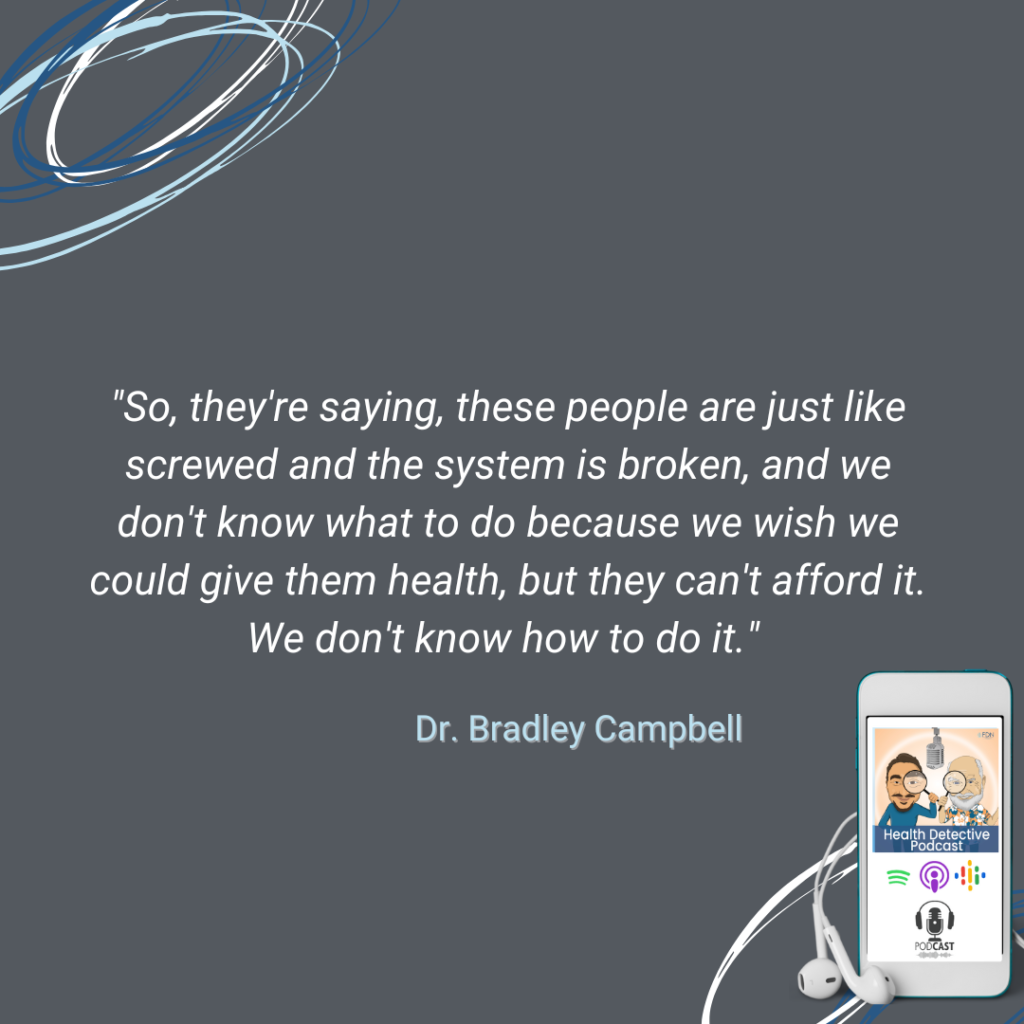
So, they’re saying, these people are just like screwed and the system is broken, and we don’t know what to do because we wish we could give them health, but they can’t afford it. We don’t know how to do it. It’s way beyond the doctors.
A lot of doctors are aware of nutrition and the importance of nutrition, it’s just we have a deficiency of practitioners. We don’t have enough doctors to go around. We don’t have nutritionists to go around.
The air is not super clean, but the water’s not clean in Flint, Michigan, or a lot of other places. The food is also a problem. We need to remake healthy soil to remake healthier food.
A lot of people just aren’t aware of even subtle things like organic food from Mexico is not the same as organic food grown in the United States. An organic strawberry, you can grow in Mexico, hydroponically in water, not soil, and it has 50% less mineral content and nutritional value of an organic strawberry grown in the United States in soil, but it’s cheaper.
Extremism in Medicine: Shining Light, Making Informed Decisions
Americans are smart. They’ll go down to Mexico and grow the strawberries in hydroponic conditions in order to then make it for cheaper and resell it back to the United States. They can make a bigger profit for less investment. The problem is that then you have to eat twice as many strawberries, get twice as many calories with half of the nutritional value.
We wonder why we have this obesity epidemic. It’s like even when people are trying to eat organic, sometimes they’re not eating the best quality, even when it is what they believe to be high quality food.
[00:16:26] Detective Ev: Wow. This is such an example of like, don’t hate the player, hate the game. Right? Because you know, they’re a business, they gotta do what they gotta do. Since we allow this, why wouldn’t they do it? You know, of course they’re going to go do it.
I could argue also that you would hope someone has a higher moral standard than that, but at the end of the day, again, business has gotta make money and there’s things implicated with this. It’s like then what do we do? Point at them too.
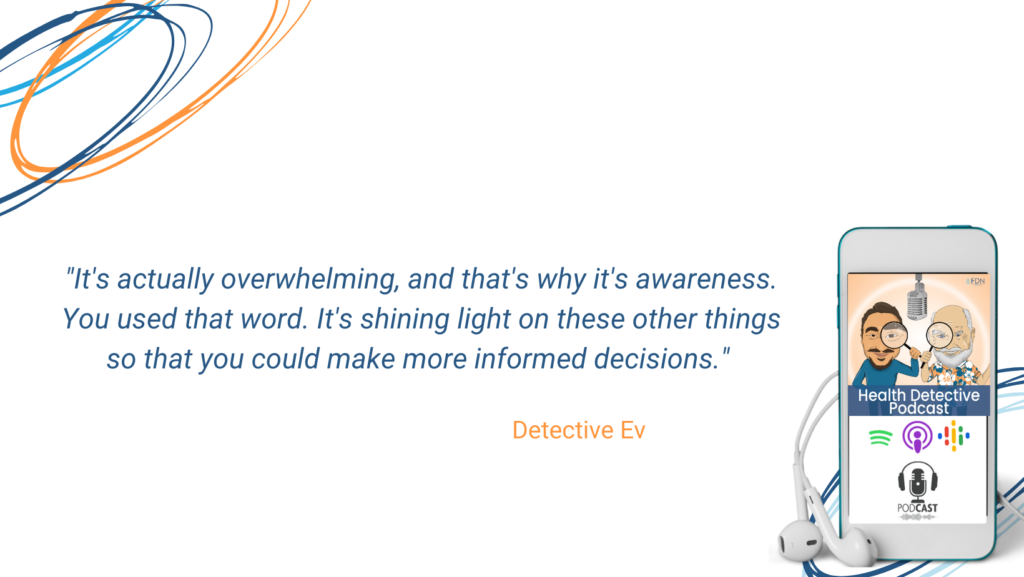
Do we point at the people with the water quality control? There’s too much. It’s actually overwhelming, and that’s why it’s awareness. You used that word. It’s shining light on these other things so that you could make more informed decisions.
It’s interesting that you brought up the organic standards too, because that was, honestly, the first thing that ever got me into this.
Local Vs. Organic
I remember at 16 it was a bot account on Twitter. Sounds hilarious but this is the truth. It was called Truth or Bot and it was conspiracy this, conspiracy that, whatever. I’m sure there was a lot of junk on there but one of the things was what Monsanto was doing and GMOs and stuff.
This was like 11 years ago; I’m reading this stuff. I’m like, this can’t be true. There’s no way. Then I search it on Google, and I find the news reports. This company’s crazy. How do they still exist, let alone eventually getting bought out by Bayer?
You guys really gotta think about why a pharmaceutical company would want to buy that. They either have a whole new strategy and they know that this is going to save the world and their pharmaceuticals are going to go outta business, or they’re smart and they know that these things might correlate a lot more than we think.
But I remember seeing that and was like, gung-ho organic. I’m like, at the very least I gotta do that. And sure, you’ll eliminate the GMOs, at the very least. Well, hopefully. But you try to do that.

Then I realized over time, I’m much more concerned now with local in a sense than I am organic. Now that doesn’t mean there’s not really crappy local. But I’m really blessed, there’s a health food chain up here near me. I’m in Pennsylvania. There’s about five of the stores, been in the family for 30 years, all family owned.
They’ll put these labels on the food and stuff. The produce says, within a hundred miles they know the farmers. There are actual relationships here, and of course I would like to know them personally, that’d be even better.
Remove the Toxin, Snap Health Back
I worked for this place for a while when I was getting started in my young adulthood in my career. I realized just how serious the relationships were with these places that they’re getting from. I love that. Yes, my beef isn’t always a hundred percent organic, but I would take that any day over Walmart or organic beef that they’re getting there.
A lot of times it’s the local quality over just these labels that seem really good but mean seemingly less and less as we move on here. You know what I mean? I feel like it means even less than 10 years ago, like organic’s gotten worse almost.
[00:18:49] Dr. Bradley Campbell: Yeah, for sure. I have a patient who’s an organic, apple farmer or grower, I guess. I dunno if you farm apples. But either way, he has apple trees and an orchard. He sells the apples.
He had a really interesting illness, which was actually, he had a mold inside of his body that was coming from the apple trees. He was just eating like 20 apples a day and he was just putting in more sugar that was feeding the internal yeast fungal mold and bouncing his body.
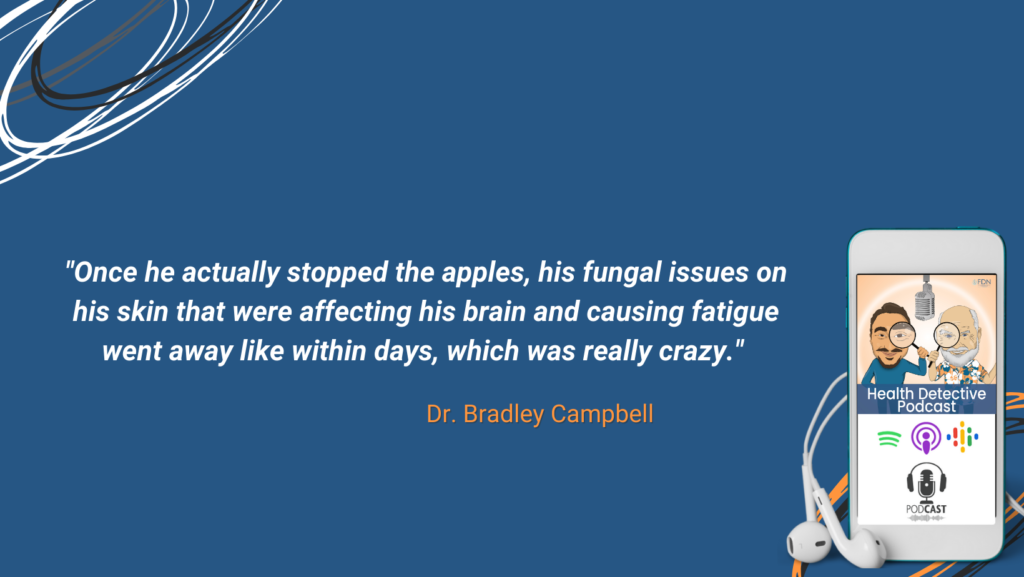
Once he actually stopped the apples, his fungal issues on his skin that were affecting his brain and causing fatigue went away like within days, which was really crazy. That was an interesting story of how sometimes you just take away the toxic factor or the aggravating factor or like an infection real fast and someone can just like snap, reverse back.
Extremism in Medicine: The Money-Making Priority
But he taught me while I was with him, as most time I’m learning from my patients throughout the day. He taught me that even though you could have your apple orchard be labeled as organic, doesn’t mean that you’re not necessarily spraying some type of herbicide or pesticide onto those apples. They’re just organic approved sprays. And some of the organic approved ones are not necessarily healthier than some of the other herbicides or pesticides, they would be spraying.
So, he was basically trying to find the best bang for his buck. He too is just meaning well. He’s like, if I don’t use any, I’m going to lose my entire crop and then I won’t be able to feed my family. I won’t be able to have an income and I won’t be able to have apples at all. So, he is like, I have to use something.

I’m going to use the one that is basically the best bang for my buck that’s going to be the most effective, while not affecting our health as much as possible. Similar to like a business, they just have to make those executive decisions of like what’s going to give us the ability to feed as many people as possible while not making huge health sacrifices.
But I think the problem with the corporation is that if someone were to make an ethical choice where they’re going to say, we’re going to put people over profit, they’ll get kicked off that board of directors. Because there’s someone else, their primary director, it’s just the way it’s set up, is that they have to choose profit first. They have to choose growing their company.
Trying To Do Well
And if there’s something that’s ethically important, but it’s going to cost the company money, then that board of directors is failing, they’re losing, and so they need to be replaced. I think it’s just the way the system is set up for. You can blame capitalism, you can blame the corporations, but I don’t think it’s truly that these people mean poorly.
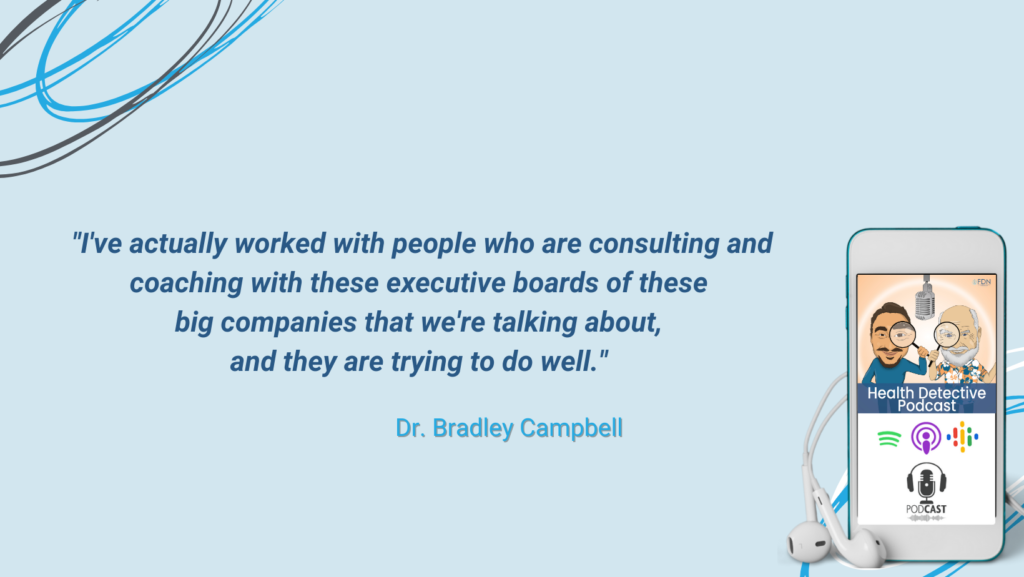
I’ve actually worked with people who are consulting and coaching with these executive boards of these big companies that we’re talking about, and they are trying to do well. It’s just they also have certain layers of priority they have to deal with as a company.
[00:21:29] Detective Ev: It goes back to the same thing, right?
Like bad Apple Farmer or Grower, who knows? Probably not, right? Just a person trying to feed their family just like the rest of us. And that’s the thing too. How old are you, can I ask? 32. Okay, so then in our generation of 27, like a lot of people do point to the capitalism, corporatism type of thing.
Again, I would love it if it was that simple. I don’t think that’s the case. I think there’s bigger things here that would exist in many different systems. So again, for me it just starts with awareness. Cause I’m not even pretending that I have the solution to all of it. I don’t think you are either.
This is really complicated. There’s millions of people out there, incomprehensible numbers of human beings running around in this country alone, let alone in the world. They all have different lives, different places where they’re from. It’s not so simple. But at the very least, I think I’m big on like what I call leveling the playing field.
Extremism in Medicine: Needing a Level Playing Field
What I mean is a level playing field is not when you or I walks into the doctor’s office with a health issue. Let’s say it’s anxiety. Okay, you could take the Xanax. Okay, great. And Xanax really works for anxiety. Now it might cause side effects, I get that. Not the best long term, but still, it does work for anxiety.
But I’m never also told, hey, have you ever considered like neuroinflammation and how that’s now correlated pretty strongly with anxiety symptoms? And if you change your diet, you could in theory reduce the inflammation, right? That’s not a level playing field.
But when we have that, then to me it’s like I don’t really care what you do, to be dead honest. Take the Xanax, take this. It’s not my decision to say one way or another. But man, I wish someone would’ve told me. Probably many of our practitioners feel this way. They probably wish someone would’ve told them the other options when they were there.
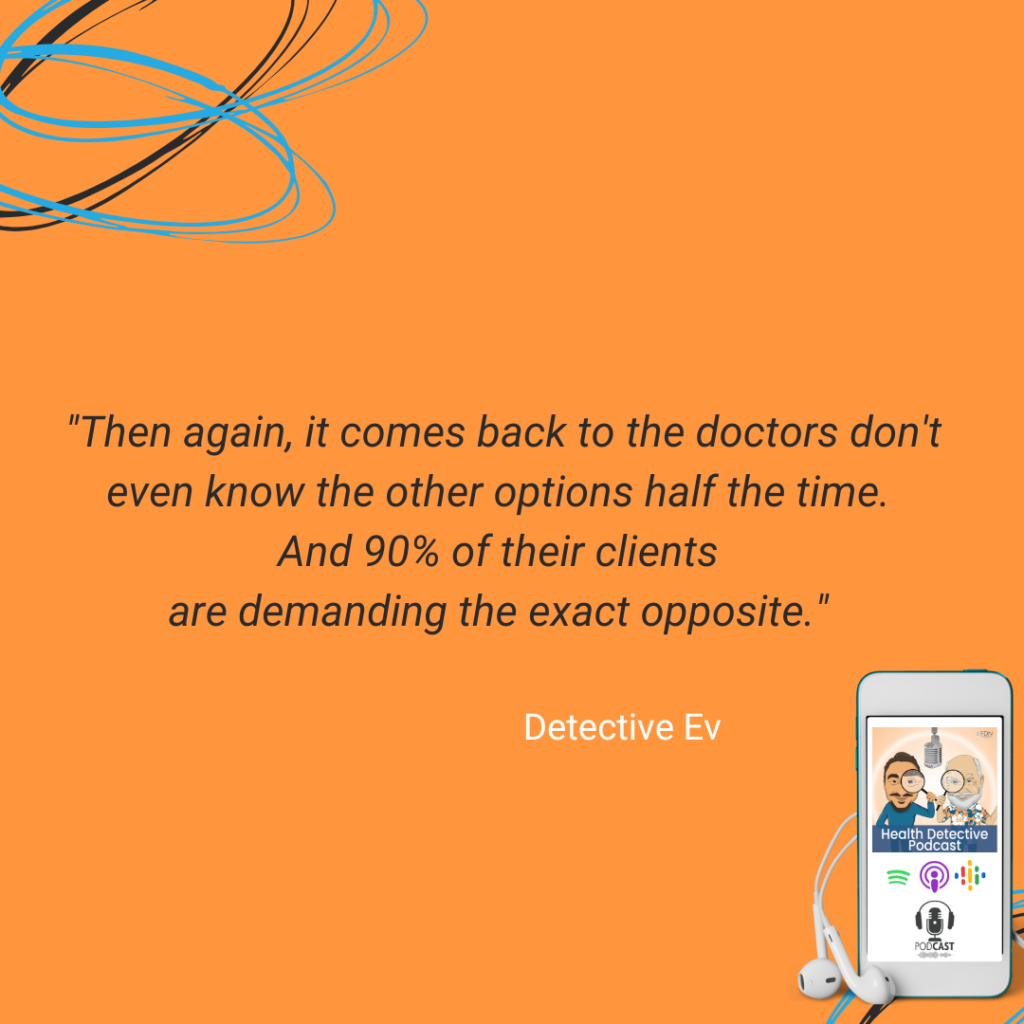
Then again, it comes back to the doctors don’t even know the other options half the time. And 90% of their clients are demanding the exact opposite. They want the quick fix and the pill.
I’ve had doctors on here, like traditional MD doctors. They’ve said this is half the issue. The patients are coming to them and because we allow direct to consumer pharmaceutical advertising on our TV stations in America, which I’ve said this before on the show. I apologize if it’s boring to people who’ve heard it before, but certainly there’s going to be a new listener today.
Extremism in Medicine: Lose the Battle and Go Help Someone Else
Only two countries in the world allow that, guys. It’s us and New Zealand. The rest of the countries of the world, even China, does not think that that’s okay to be doing.
Then you got Sally coming into the doctor’s office and saying, I want this thing because the TV made it look good. Then the doctor is in a really weird position because he’s or she’s got 10 minutes with this person. You can either argue with them for 10 minutes or you just give him the prescription and get the heck out. This is really complicated.
[00:23:45] Dr. Bradley Campbell: A lot of them will just give them the prescription, get out. Cause they want to spend that extra eight minutes with someone else who could be better educated. It’s like it comes down to a practicality.
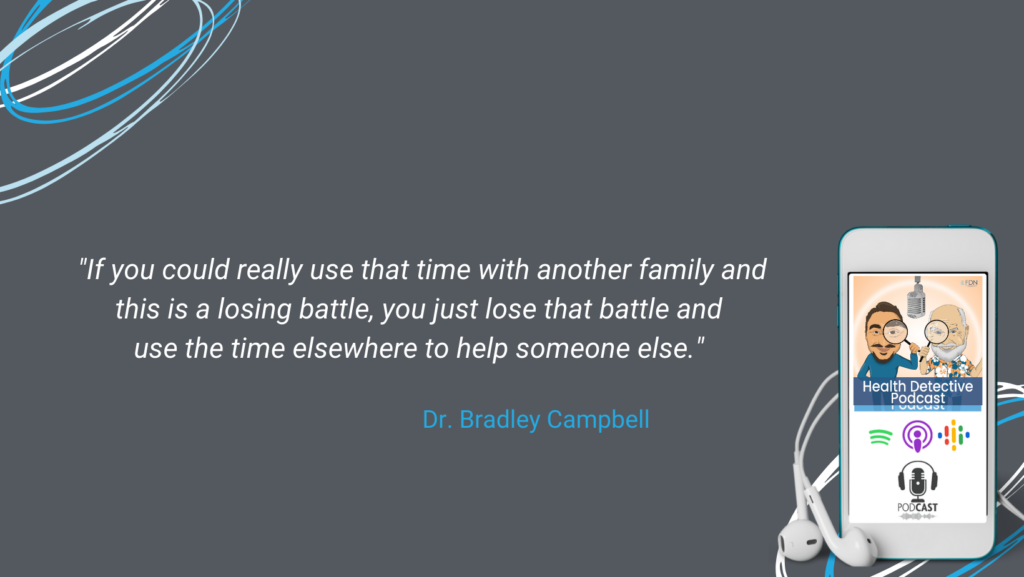
If you could really use that time with another family and this is a losing battle, you just lose that battle and use the time elsewhere to help someone else.
[00:24:02] Detective Ev: One more question about your personal story with the health side. You asked your doctor at the time, hey, can foods maybe make my sinuses a little clogged or produce more mucus, whatever you might have worded it as.
I’m curious. Again, you’re obviously a smart guy, so maybe this was just genuinely a thought like that. But I’ve met super smart people that are never connecting the dots between the food and the health symptom connection. My last question there is, is there any other correlation?
Did you have a mom or dad growing up that was into this? Or was it truly just this thought outta nowhere, kind of like bam, intuition, maybe that’s my food doing this?
Maybe Food Does Matter
[00:24:34] Dr. Bradley Campbell: I have a dad who’s a dentist and a mother who’s a nurse, and my mom was more into the natural side for many reasons. I think cause she had some car injuries where chiropractic helped her and that kinda opened her into the gateway drug natural healthcare.
But I think, at the time, it was just a friend. It was like a sheer luck of the draw. I had a friend who had told me that citrus food was making him congested. So, I think what I was doing the week before I was like, Well, that’s interesting. Why would a tangerine or clementine, why would that make him congested? That’s really weird that food could actually do that.
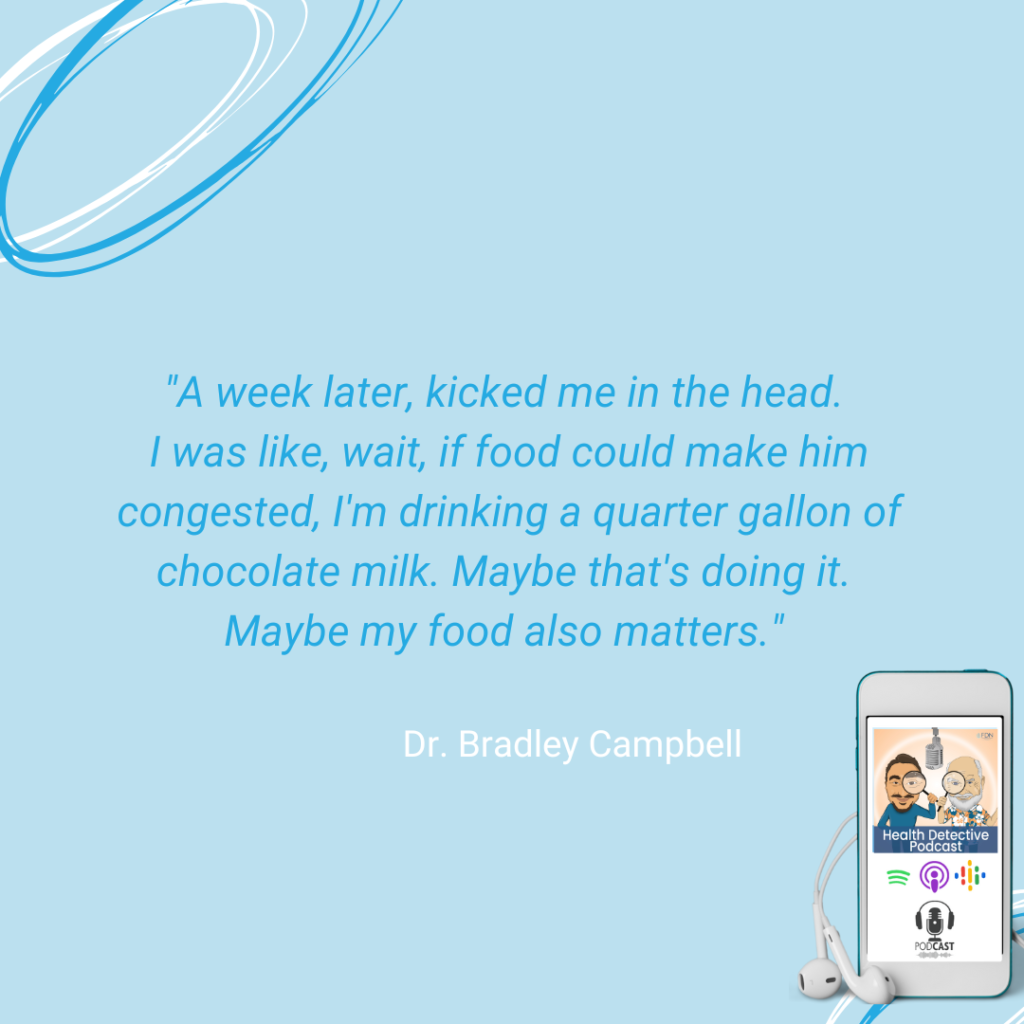
A week later, kicked me in the head. I was like, wait, if food could make him congested, I’m drinking a quarter gallon of chocolate milk. Maybe that’s doing it. Maybe my food also matters.
[00:25:22] Detective Ev: The reason I hone in on that question is because it’s something I ask every time. I want to know how can we replicate this for other people?
I’ve had family members, maybe it’s been the case for you, probably in a certain way. My aunt she was in the gifted program at our local school district, so this is an objectively brilliant person. She ended up passing away from cancer. She was not willing to make a dang change.
I was already well within this space. You know, I politely sent over some stuff. I’m like, hey, if you ever want to talk. Because you don’t want to bother someone in that state either. That is a really serious thing. It was a brain cancer.
The Answer Within
It lasted for like three years and there was ample opportunity to do some things like this. The last thing I’m doing is condemning someone for making choices that ended up leading to that. Clearly, she didn’t want to die. But my point is I just couldn’t believe it. I’m like, this person is so smart, but this system has her so trapped in this that she’s afraid almost, paralyzed, to go away from anything else.
So, I want to know how can we replicate this for people, before they’re in that paralyzing fear. And Dr. Campbell, honestly, the main thing I hear, and I don’t know if this is the case with your patients, most people don’t really give me any other answer other than it was a gut feeling. They didn’t even have like a thing, they just eventually said, you know what, this doesn’t make sense.
Now how the heck do I replicate that for someone else? There’s all different IQ levels giving me that answer, so I don’t know how we give that to someone else necessarily. But believe it or not, that’s the number one answer I get is I just knew something didn’t make sense.
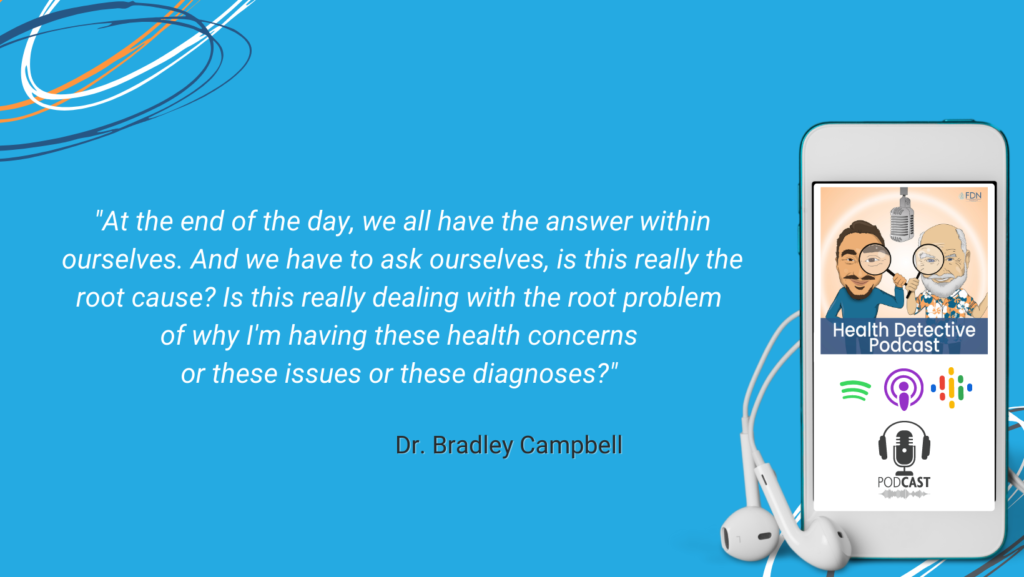
[00:26:42] Dr. Bradley Campbell: I think that’s it. At the end of the day, we all have the answer within ourselves. And we have to ask ourselves, is this really the root cause? Is this really dealing with the root problem of why I’m having these health concerns or these issues or these diagnoses? Does the label make sense? Does a syndrome make sense, or is there something deeper going on?
Accepting Responsibility Is Empowering
At our deepest heart of hearts, when we’re being really courageously honest with ourselves, we know what’s causing most of our health issues. We know it’s most likely us that’s the problem. It’s just educating people on that fact that you might have some responsibility in what happens to you.
Even if you didn’t know why this happened, you might be able to help yourself fair better if you make certain choices now. It’s like even if you’re not the one who punched you in the face that caused your eye to pop outta your head, you still have a role in saying how your other eye that you still have left is going to fair.
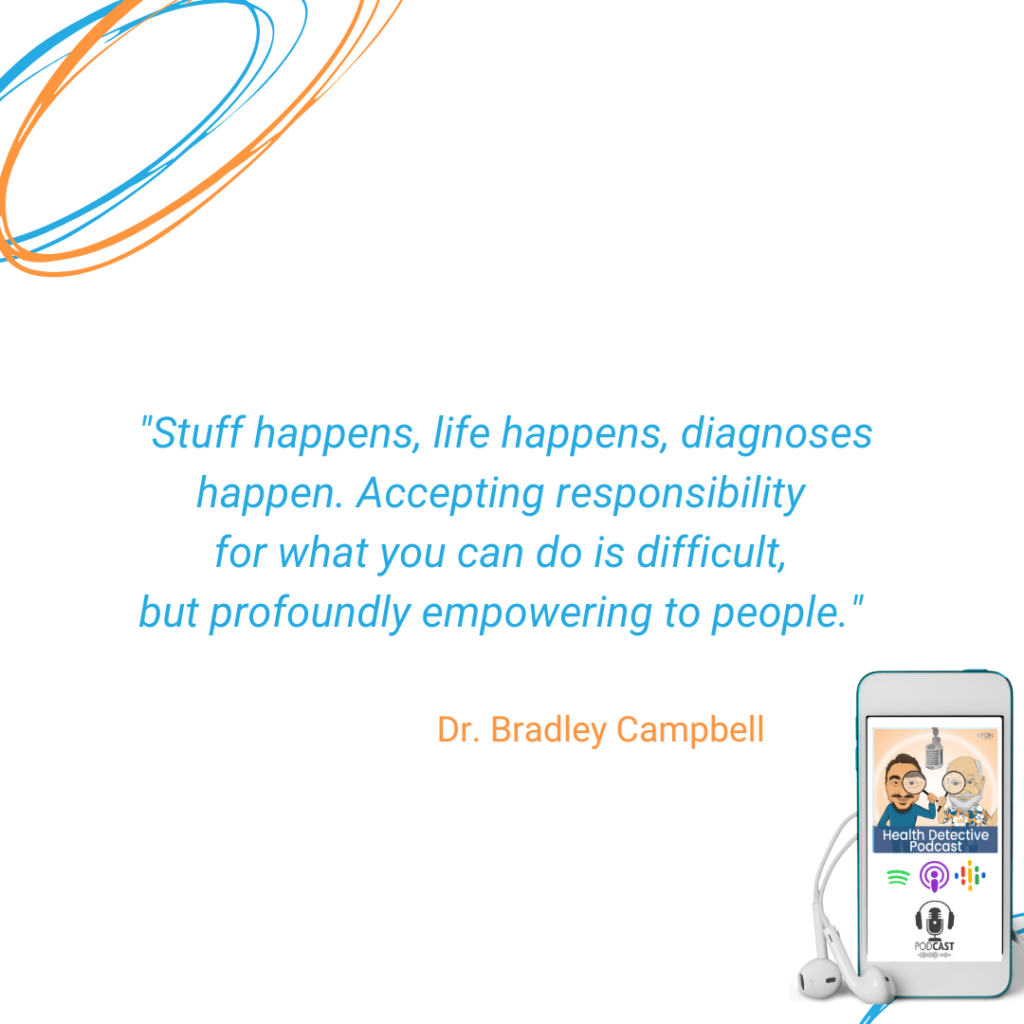
You could get diabetes, you could get glaucoma, and then you could get eye surgery and cataracts and macular degeneration, or you could eat really well and keep your other eye super healthy. Stuff happens, life happens, diagnoses happen. Accepting responsibility for what you can do is difficult, but profoundly empowering to people.
They want control, they want to be in charge. It’s just a little tricky to start to tell people like, hey, maybe those food choices aren’t the best. Maybe you can start upleveling and doing a little bit better this week and then this month and then next year you can do even better.
I think people get overwhelmed cause sometimes they feel a little too hard on themselves. Like, there’s no chance for me, I eat McDonald’s every day. So, they’re overwhelmed by the thought of having to cook for themselves or just do a little bit. But if you just start really small you can regain control of your health again, quite rapidly.
Slow and Steady Diet Improvements
[00:28:32] Detective Ev: This is an interesting point. I’m curious if you see this with your clients. I think one of the biggest barriers too is a lack of belief sometimes. That’s why I love getting to share these stories.
It’s one thing to say, let’s eat this way. I do think, myself included, it’s very hard for the average person to conceptualize because it’s not linear and it’s not necessarily objective in the sense that you have to eat this way for 30 days and this gets better. Whereas, like if we give them a pill, there’s an expectation.
Like an SSRI Right? What do they say? Two to three weeks you should start feeling something here. Xanax. No, first time you should start feeling this. I take an Ibuprofen. Yeah. 45 minutes. We can’t really do this with, and I’m oversimplifying it, of course. Like, go paleo. Oh yeah. 30 days everything would be fine.
Are you experiencing this with clients and patients that they just don’t even necessarily believe, or maybe you just think this, and they don’t acknowledge it themselves, but they don’t even believe that this can work for them?
[00:29:23] Dr. Bradley Campbell: Yeah, that is a big educational hurdle for us as natural healthcare practitioners. It’s drastically more effective, but way slower.
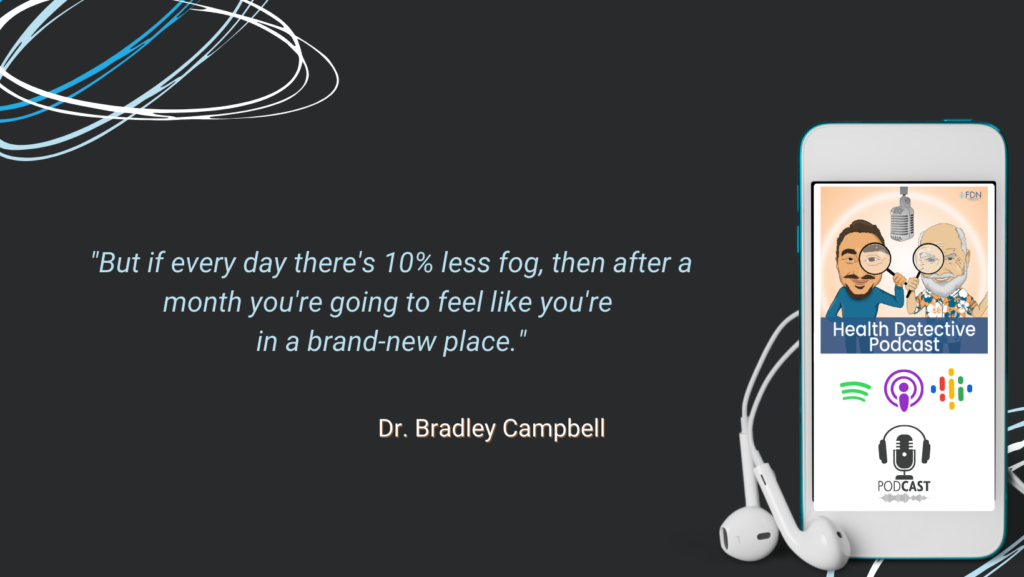
It’s like If we were able to modify the weather somehow and reduce the fog. Like you live in a really foggy city, like, you’re in London and there’s always fog. Then one day there’s 50% less fog, you probably wouldn’t even notice that much. Or if there’s 20% less fog, you’re not going to notice. But if every day there’s 10% less fog, then after a month you’re going to feel like you’re in a brand-new place.
Trust Your Practitioner and Your Body
That’s kind of how dietary changes go. It’s just that slow, steady peeling back of the suffering or the fog or gaining more clarity, more energy.
When you wake up a month or three months later and you’re like, wow, I’m not falling asleep after lunch anymore. Wow. I can actually sleep through the night. Or like, that itchiness is gone. Or like that wart I had, where’d that go? Hmm. That’s interesting.
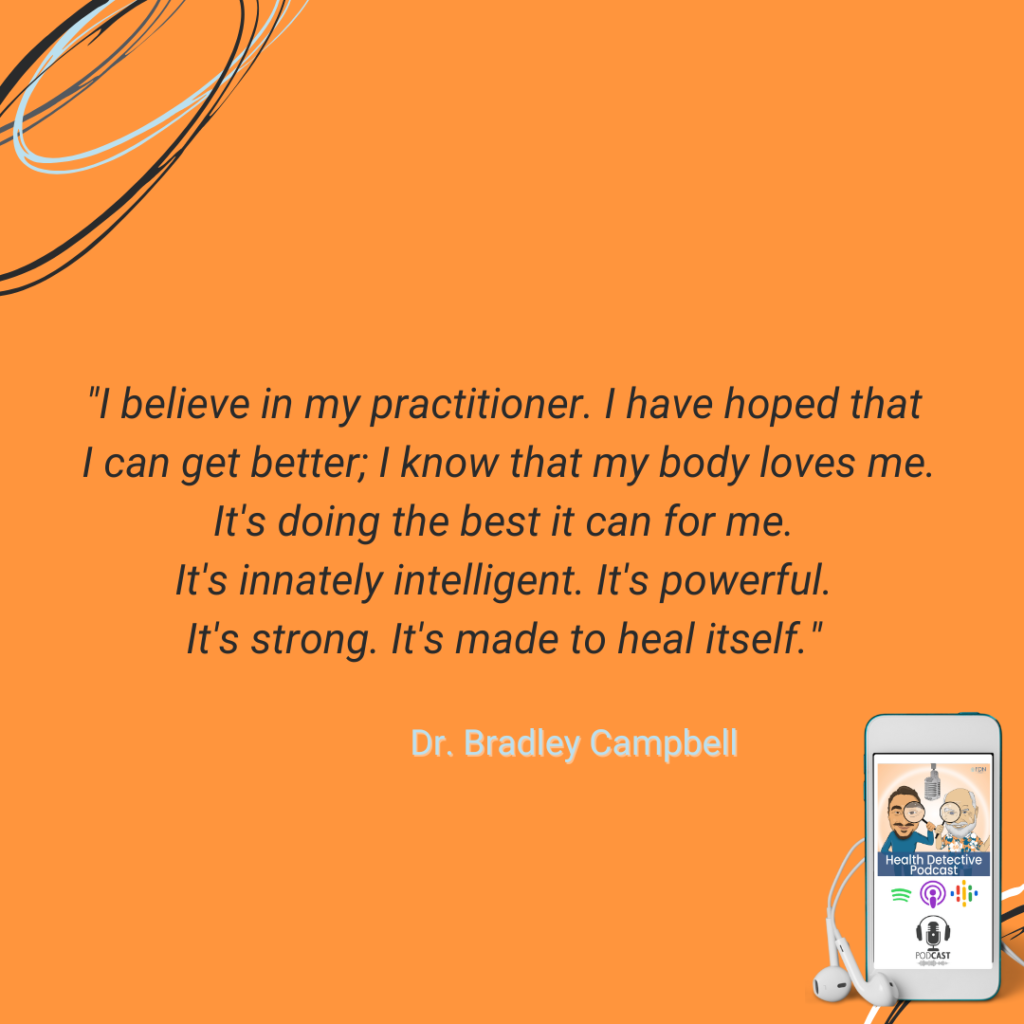
A lot of these subtle changes, you just have to trust people like you and me or trust the practitioners to say, Okay, this is going to work. I believe in my practitioner. I have hoped that I can get better; I know that my body loves me. It’s doing the best it can for me. It’s innately intelligent. It’s powerful. It’s strong. It’s made to heal itself.
If even if I treat it like crap, I can still get cut and it’s still going to heal even if all I’m eating is fried chicken. We can really do a lot. Our bodies are trying to do a lot for us, and they’re doing the best they can with what they have.
If we give our bodies really good raw material, it will generally treat us really well in return. That’s why I never really start with dietary changes with people because it is such a big hurdle.
I almost always suggest that that’s going to be something we’re about to do. But I’ll start with B vitamins, vitamin D, adaptogens, magnesium, like four or five supplements that I know are going to make a shift the first day they take them or the first time.
Getting Some Quick Wins, Building Rapport
So, I’ll give them some pretty strong herbs or strong vitamins because I know if you give someone a B12 shot or high mega doses of B complexes, they’re going to feel a little different. That’s how I hook them in.
Give them the hope in terms of like, here’s what I’m giving you. Here’s what you’re going to experience. You’re going to pee out really bright yellow, then I’m going to give you beats and you’re going to pee red. And you’re like, wow, this doctor knows what he is talking about.
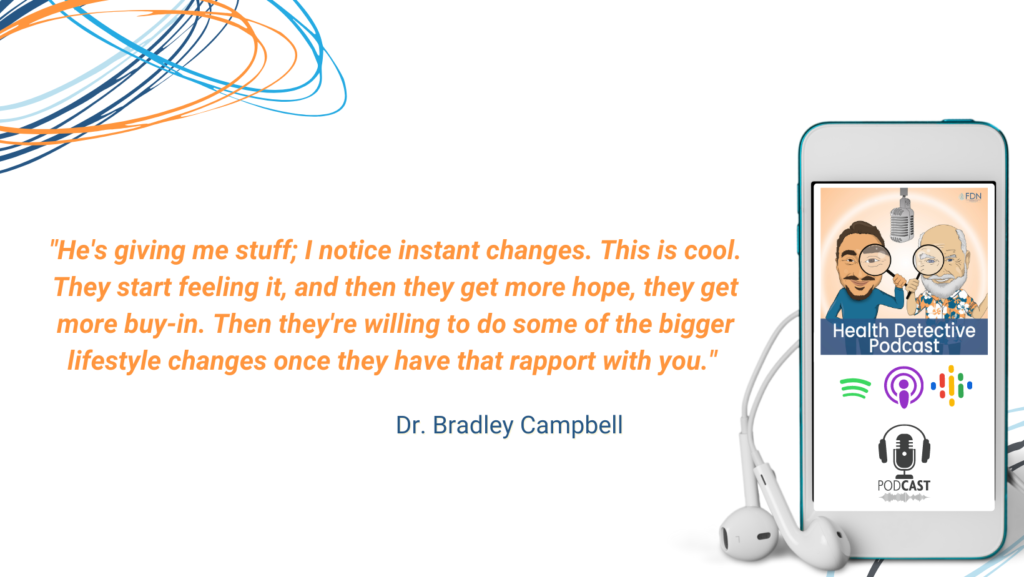
He’s giving me stuff; I notice instant changes. This is cool. They start feeling it, and then they get more hope, they get more buy-in. Then they’re willing to do some of the bigger lifestyle changes once they have that rapport with you.
[00:31:37] Detective Ev: I 100000% agree with this cause this is what I’ve seen with clients.
I always look for like the easy wins in the beginning. People are actually relatively fair. If you can just, especially if their needle has not been moving in years, if you get that needle moving 10%, you can get someone locked in for a year after that. They just need to know that something that you’re saying is going to work.
They’ve probably been through the ringer a lot. They’ve been to a lot of different places, We always call it like the cycle of trial and error here. They went to this doctor, this pill.
Then they do the natural cycle of trial and error where they are now at the supplement store or the supplement section in the health food store. They’re trying this and that and talking to the person who does it. Maybe they get 2% better at best.
Chiropractic, Acupuncture, NET
So, if they can see the thing that motivates them, it’s good to go. That happened with me. I mean, I had severe cystic acne. Switching to organic, moved that needle quite a bit. Now it took me years to actually get to a place where I was comfortable with the skin. But at the same time, I had motivation the whole time because I knew I was onto something here cause nothing’s worked in over 10 years.
Then I switched my diet. I’m still kind of eating crappy food, I was just eating organic crap. Just that little bit less of a toxic load I guess really helped me a lot cause the skin’s a detox organ. So, something worked there.
I want to transition into your work a little bit for the last 16, 17 minutes here so people know what you’re doing and where they can find you. First things first, you’re both in person and online. Is that correct or am I wrong with that?
[00:32:54] Dr. Bradley Campbell: Yeah, I mean, I teach online. I have an online membership to help educate people. But my primary, 50, 60-hour week thing is treating patients. I do four or five days a week. I do 7:00 AM to 7:00 PM and see a bunch of patients in half hour-to-hour long visits.

I do chiropractic, acupuncture, NET, which is a stress reduction technique, and a lot of lab testing and educating and coaching and things like that to help people get healthier. That’s my true love is I run an integrated holistic clinic with about four or five practitioners and four or five staff just north of Chicago. We’re not currently taking new patients, but there’s a wait list on our social media links.
We All Need an Outside Perspective
Because that’s been so busy, that’s why I started the non-profit to try to teach more doctors, teach more patients how to be healthy, to be their own best doctor as much as they are able. There’s like this paradox in the natural health community, it’s like you are your own best doctor. But he who is his own doctor is a fool.
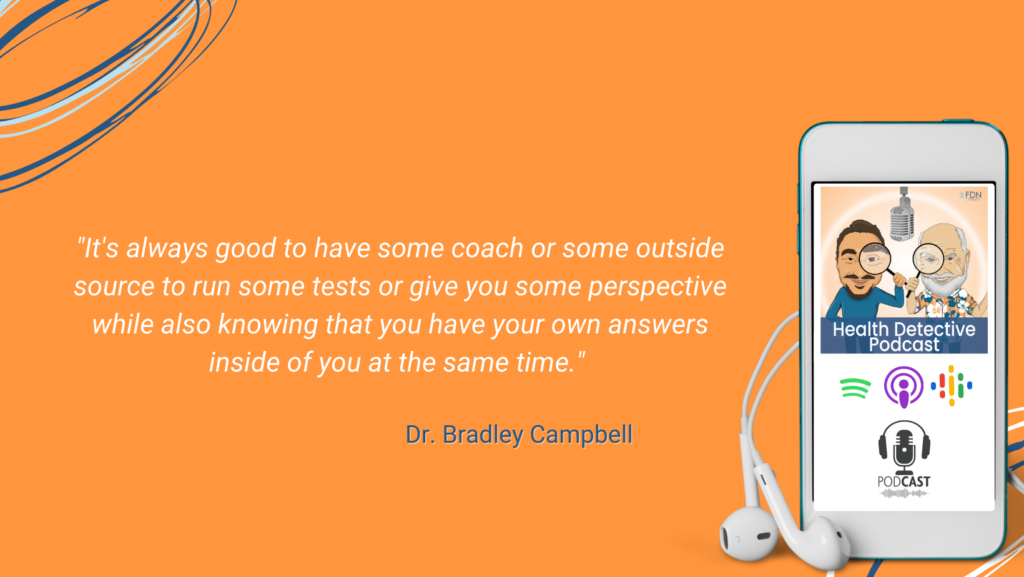
It’s always good to have some coach or some outside source to run some tests or give you some perspective while also knowing that you have your own answers inside of you at the same time.
[00:33:59] Detective Ev: I’ve never heard that in all the years in this space I actually really like that. That makes a lot of sense because I even do that myself.
We have a system here at FDN where there’s like, the medical director program. Not all of us are doctors. In fact, the majority aren’t. But we have doctors on our team and then we have other practitioners that might as well because of the amount of knowledge that they know.
Whenever I run labs on myself, it’s like, all right, cool. Like, I know what this is, but why would I not get their set of eyes looking at my labs as well? I want that, you know? I think that makes a lot of sense. And I knew that you were going in person somewhere every day, because I always see you doing the convertible videos, which I think is awesome.
This just shows your dedication to the space because you do not strike me at all as a guy that buys a convertible to be flashy. I feel like you bought this just to get the light exposure in the morning for such busy days.
Teaching From a Convertible
[00:34:42] Dr. Bradley Campbell: Pretty much, yeah. And I got it cause my dog loved it. I rented one and put my dog in the back and that’s part of why people watch. He’s in the back, lifting his head up in the windstream and having a good time.
I bought a cheaper car cause I didn’t want a car payment. Then I sold that car for a cheaper convertible. This is like an old grandma Toyota Camry Solara from 2007. I just kept getting older, cheaper cars to pay off some of my debt sooner. Cause I didn’t want to do the flashy thing. But he loves it. I like the convertible. It’s a fun way to go to work.
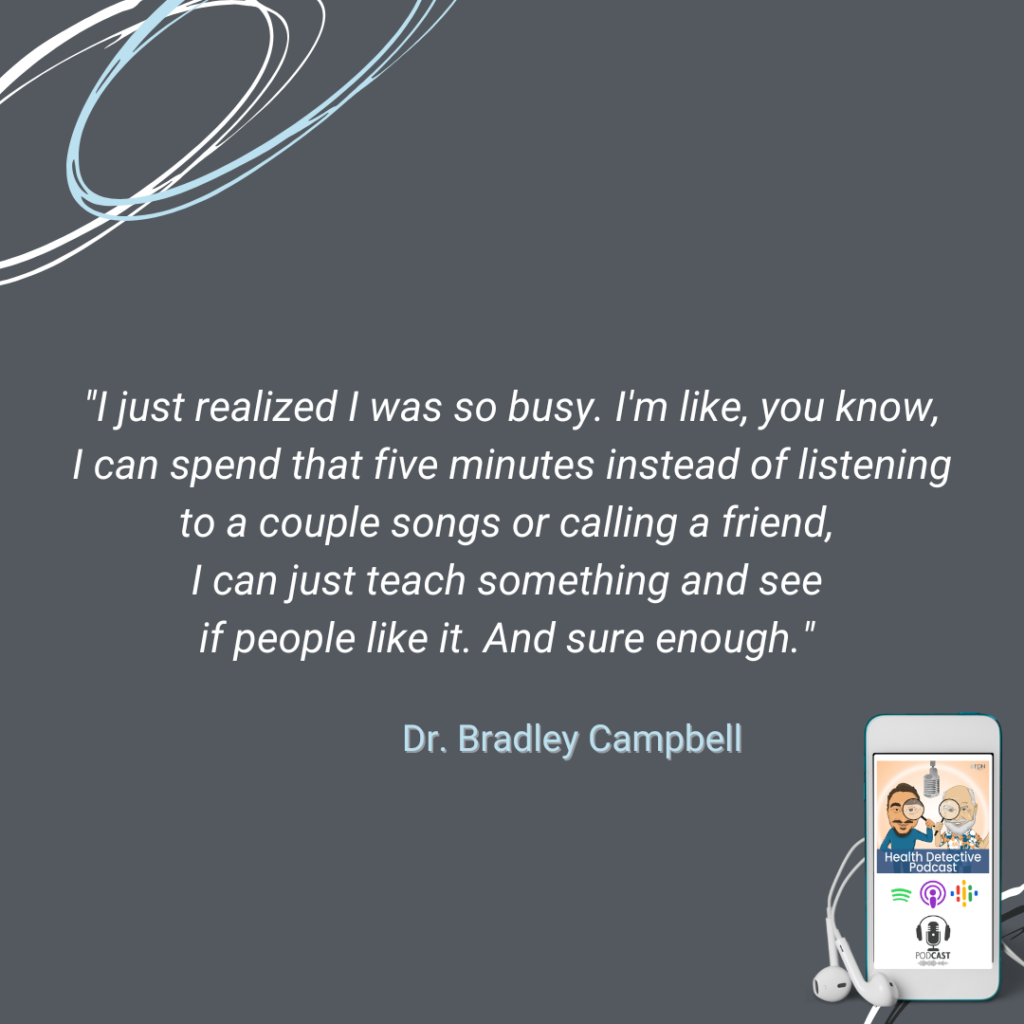
I just realized I was so busy. I’m like, you know, I can spend that five minutes instead of listening to a couple songs or calling a friend, I can just teach something and see if people like it. And sure enough.
[00:35:21] Detective Ev: I was about to say, that five minutes ended up being kind of fruitful, huh?
Dr. Bradley Campbell: Yeah.
Detective Ev: I use my car as like a classroom a lot, right? And just switching those simple things makes all the difference, especially when you add it up over a year, two years, three years. It’s the compound effect. So, yeah. That’s cool because I think we gotta start selling the fun things of this space more.
I’m telling everyone to get a convertible. They’re like, I gotta do that for my health. I’m like, yes. They’re like, Oh, okay. All of a sudden, the checkbook starts coming out. They could afford that. They couldn’t afford the supplements, but the convertible, they got.
Chronic, Complex Illness Type People
With that said, I know you have a wait list, I understand that. But who are the main clients that you’re seeing? Are there certain patterns? Is there a certain demographic? Who typically comes to your place?
[00:35:54] Dr. Bradley Campbell: It might be like you as like a health detective, myself too. It’s sort of like the people who have been to 10, 20 practitioners and can’t really figure things out.
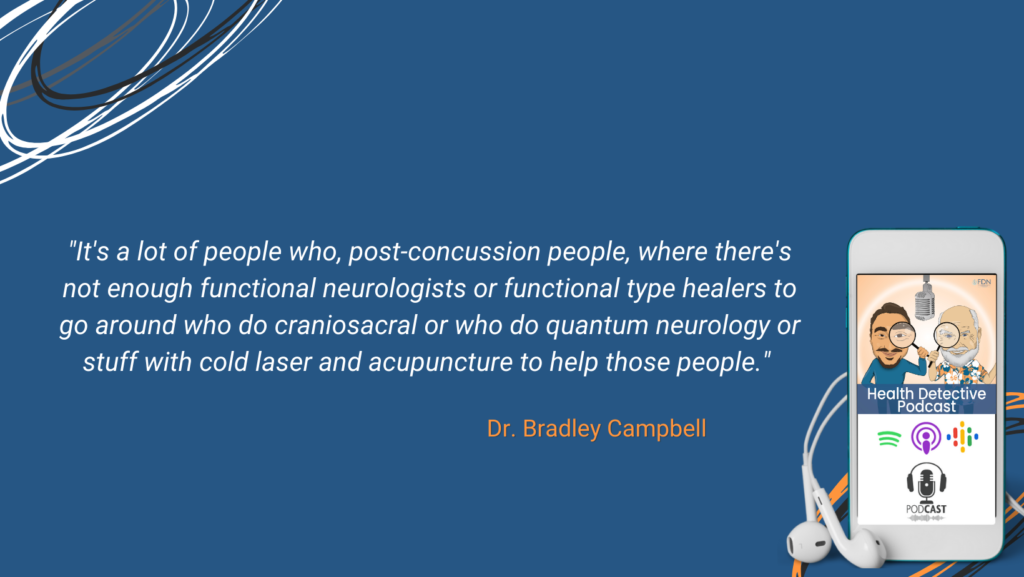
It’s a lot of people who, post-concussion people, where there’s not enough functional neurologists or functional type healers to go around who do craniosacral or who do quantum neurology or stuff with cold laser and acupuncture to help those people. It’s a lot of the chronic complex illness type people.
I still see families who have like colds and flus and do all the primary care medicine type stuff, and that’s typical chiropractor acupuncture type things. But the bread and butter is typically the people who need a diagnosis or who have a diagnosis but have made zero headway on it.
[00:36:36] Detective Ev: So, you said, we already kind of talked about, first thing normally for people is going to be these supplements that will help them feel better quick, so they know, okay, this isn’t a crack guy, this is something that’s going to work. He guessed the color of my pee. Like he knew what this was going to be. I like the guy. I’m impressed now.
That is not a small point cause if you do not tell someone that their pee is going to change with B vitamins, and you mess up with that. I’ve learned my lesson, I’ll put it that way. Because they start freaking out like, my God, what did this guy give me?
Utilizing Different Lab Testing
It’s like, you are so good, it’s not even funny. Like that’s the last thing you gotta worry about. But okay, so you do that with them.
And then you mentioned that you utilized lab testing as well. Is that more individualized for the individual or is there a system or set of labs that you typically like to run?
Because here, and we’re open to different perspectives, we typically do go with an approach of like a set amount of labs because we think it covers so much that we do have great results with it. But of course, there’s other people having success with very different systems. So, is it more individualized or a system?
[00:37:35] Dr. Bradley Campbell: A little of both. I have some basic markers, blood markers I’ll always check on everybody. Inflammatory markers like hsCRP, and homocysteine. I’ll check some basic like CBCs, CMPs, if people don’t have that. Things that they’ll get normally run. Then I’ll, depending on their case, I’ll tweak it.
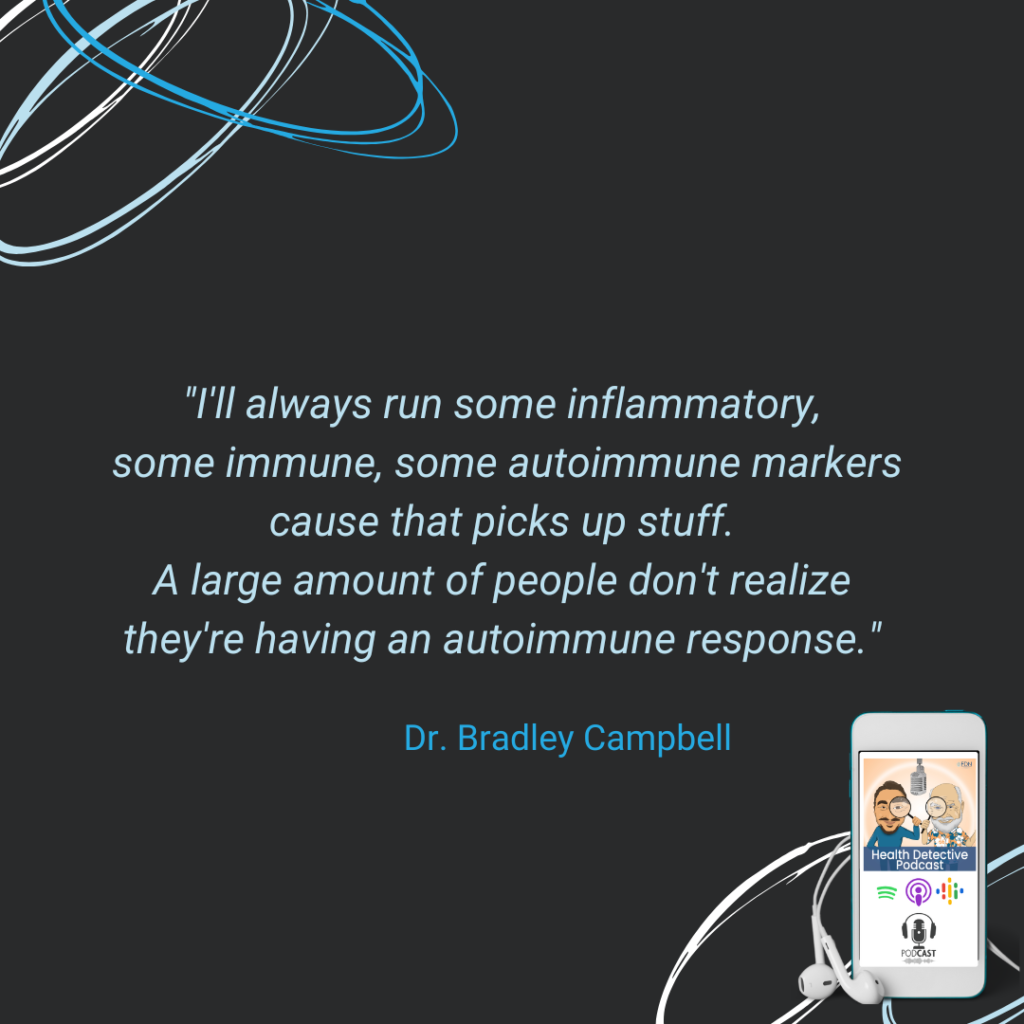
I’ll always run some inflammatory, some immune, some autoimmune markers cause that picks up stuff. A large amount of people don’t realize they’re having an autoimmune response. And hormone testing. I’ll almost always run a full thyroid panel, some DHEA, cortisol, testosterone, some for women, some female sex hormones. I’ll run those in just about everybody.
Then depending on what issues they have, I’ll add on extra tests on top of that, whether it’s urine, salivary testings, functional gut testing, that type of stuff.
[00:38:22] Detective Ev: Okay, fair enough. So, we have like the set stuff that most people are probably going to receive, and then depending on the case we might branch out.
Extremism in Medicine: Measuring Homocysteine
That makes sense because sometimes less is more, and especially with how much this stuff costs. Of course, this is not like insurance-based stuff yet. Amazing how the stuff that works isn’t what is covered by insurance, but not the point. It’s just you want to be respectful to the client and patient when we can and try to do that stuff.
I also love that you measure homocysteine. I appreciate that because I have a family history on my dad’s side of some kind of heart stuff and I was already like doing really well in the last several years. Then I ran a full blood panel, I ran like $200 worth of blood work on me. I wanted everything, full thyroid, all this stuff and homocysteine was on there.
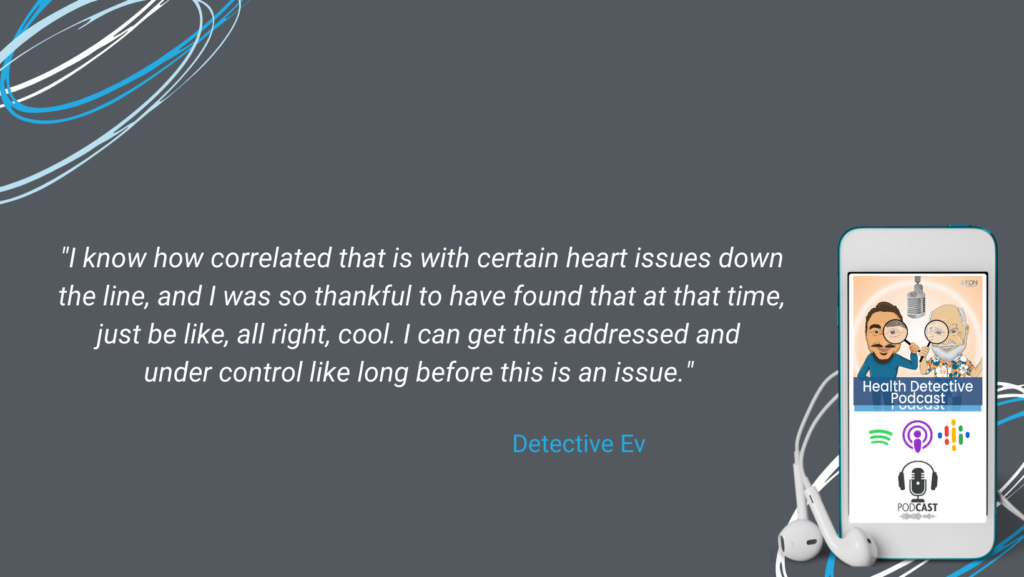
And was it extraordinarily high? No, but it was actually borderline high even for the Western range, and I felt good. I know how correlated that is with certain heart issues down the line, and I was so thankful to have found that at that time, just be like, all right, cool. I can get this addressed and under control like long before this is an issue.
There is admittedly, and I have no problem saying it. Even in the functional space, there is not many people looking at those markers, not nearly enough. I find some people don’t even know what the heck that is.
[00:39:28] Dr. Bradley Campbell: Yeah, it’s pretty wild. But as you know, it won the Nobel Prize in Medicine a few decades ago.
Detective Ev: I actually didn’t know that admittedly.
Extremism in Medicine: High Homocysteine Issue
Dr. Bradley Campbell: There’s a book, The H Factor Solution, is a book that talks all about it for who are like really curious or who have high homocysteine and you can’t get it down. It’s a great book to dive into.
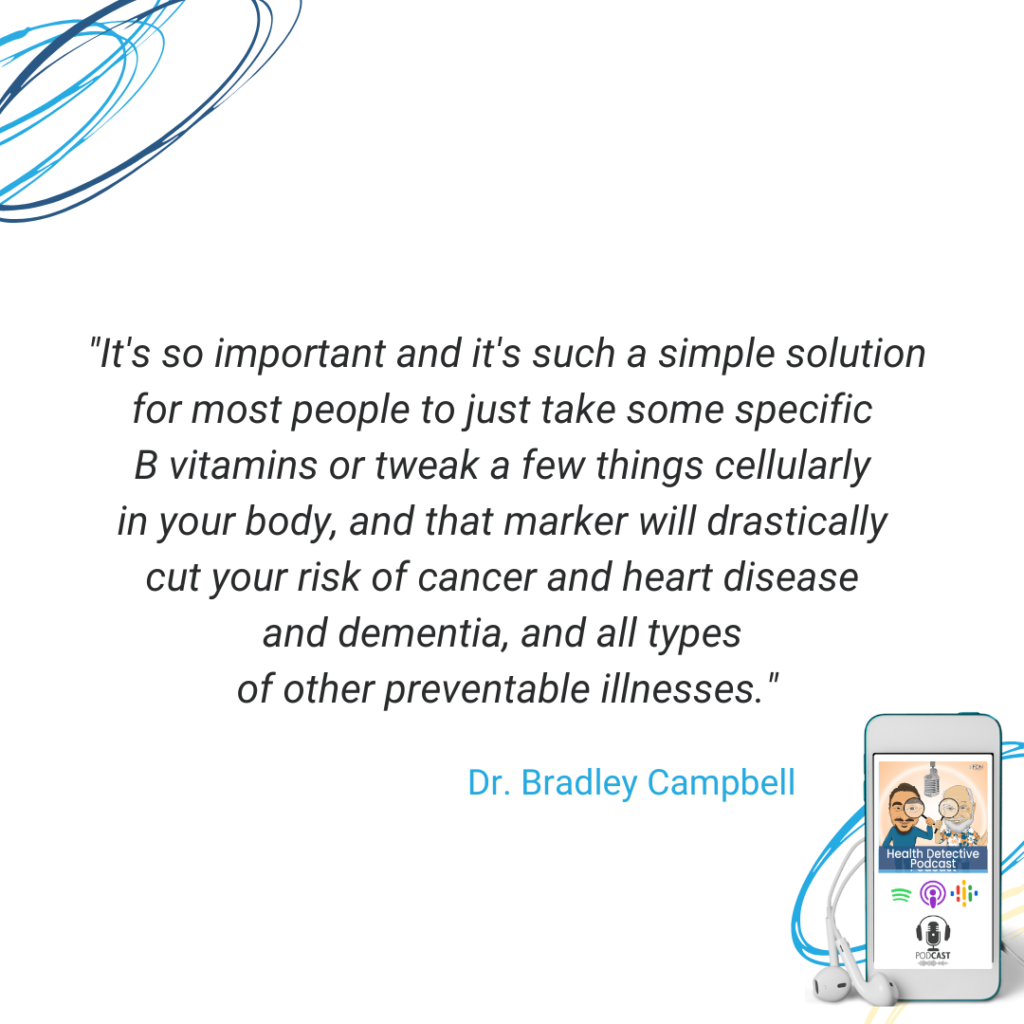
It’s so important and it’s such a simple solution for most people to just take some specific B vitamins or tweak a few things cellularly in your body, and that marker will drastically cut your risk of cancer and heart disease and dementia, and all types of other preventable illnesses.
[00:40:03] Detective Ev: All right. We do the preliminary stuff, get the needle moving for them. They’re feeling better. Now we’re running some labs. How long are people typically working with you, especially since they have to come in person? Is this like a few months or what are the programs typically?
[00:40:14] Dr. Bradley Campbell: I don’t sign people up for programs. It’s more just like if they want to come back, great. I usually recommend that the beginning people come back every one to three, four weeks. If I stretch them out more than a month, they’re not going to come back cause the scheduling and logistics and they lose interest.
But typically they’re coming in for like three to four to six months, depending on the problem. Making some big changes and then ideally getting out so I can get some new patients in. I’ll tell people this, if you really like coming, it’s really good for you to get regular care, whether that’s weekly or monthly or seasonally. Whatever you enjoy or you find valuable for your health, the more you can do, likely the better.
First Step in Healing: Awareness
And that’s the thing about some of the hands-on healing with chiropractor or acupuncture. It does keep you at tip top shape, kind of like working out. You can’t expect to work out one time and then keep huge muscles.
Can’t expect to get adjusted or get acupuncture and stay balanced the rest of your life. So it’s good to go back and keep those muscles strong, whether that’s chiropractic or massage or meditation. It’s good to find something that you’re doing on a consistent basis.
I think working out is probably better than seeing a healer. But seeing a healer, at least seasonally is really helpful for most people just to get that outside external feedback.
Same as a coach. You wouldn’t be a cross country runner or a football player and just practicing by yourself the whole time without a coach. You need someone to look at you and tell you, hey, did you know your foot’s turning this way? Or you can turn this way. You’re a little bit off over here. It helps to have that external guide to give you some feedback and awareness.
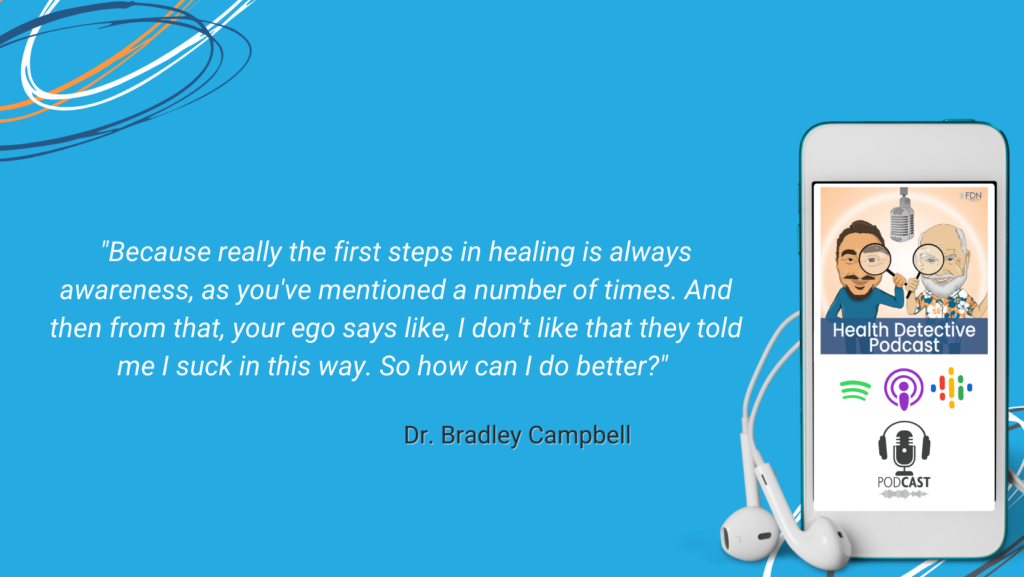
Because really the first steps in healing is always awareness, as you’ve mentioned a number of times. And then from that, your ego says like, I don’t like that they told me I suck in this way. So how can I do better? I don’t like that my water in Chicago is probably tainted with lead or fluoride or chlorine. How can I do better? From that, even if you don’t have the instant solution, you’ll Google it. You’ll start to do some of your own research and you’ll figure out how to make that problem go away.
Client Testimonials
[00:42:07] Detective Ev: 100%. Now with your work schedule, you’ve worked with quite a few people it sounds like. I always love to ask this towards the end of the show, and I just want to know to the degree that you’re able to share, cause I know there’s privacy stuff, that’s fine. But what are like maybe one or two of some of the top testimonials or client stories that you have of people coming to you?
In our world, man, yeah. People come at the end of their line, and you could really change some things for them. So, I’m curious.
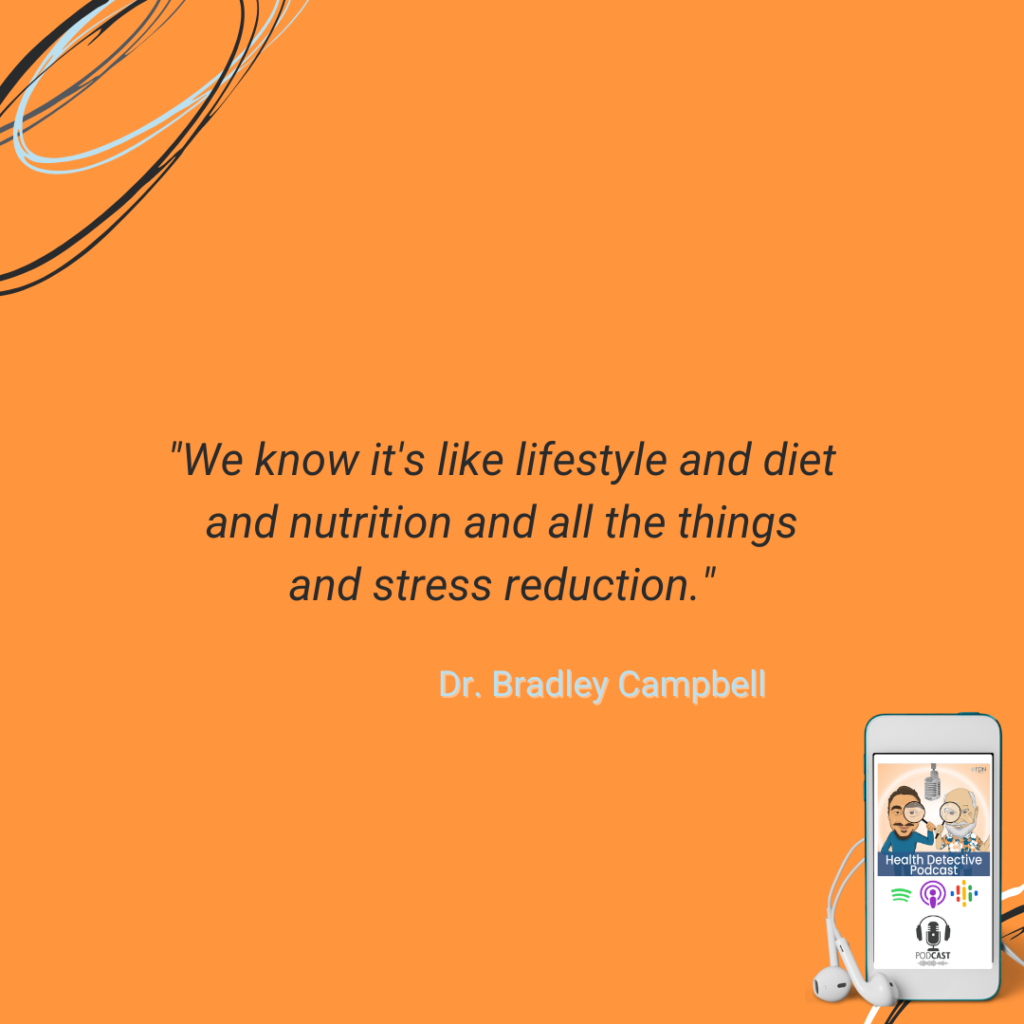
[00:42:29] Dr. Bradley Campbell: You know, we’ve had a lot of different mysterious conditions go away. We’ve had ones where people have MS that’s no longer there. We have conditions where people have had things from like Hashimoto’s and Crohn’s and colitis just mysteriously disappear. Doctors aren’t sure how. We know it’s like lifestyle and diet and nutrition and all the things and stress reduction.
One of the coolest cases I had though was a patient who was coming in and I wasn’t even really sure why they were coming in. A dad was bringing in his daughter where the daughter was having some chronic health conditions and the daughter wasn’t really getting a lot better.
She would make improvements, but then she would just kinda like revert back. What ended up actually happening was, one day I was like, well, if you’re not taking any of my suggestions and your problem isn’t getting better, why do you keep returning? I’m trying to remember the story so I can tell it perfectly.
A Father Learning Through His Daughter
What happened was the father was actually bringing his daughter in to learn by osmosis, and a lot of the teachings that I was teaching the daughter of stress reduction techniques and other things like that, was helping the dad more than it was helping the daughter who is the patient.
So the dad was learning how to regulate his own emotional stress and his own trauma. The daughter was like, I’m not getting better per se, but my dad is no longer beating me. Hmm. That was like, Wait a second. Like I didn’t know that was happening. They didn’t tell me that was happening.
But the dad was dealing with some major liver issues and anger issues, and I’ve been talking to the daughter about her liver and anger issues. But the dad was able to resolve his own liver by stopping drinking, getting less angry and ragy, and not abusing his daughter. Now they didn’t come back because I think the dad was too embarrassed at what his daughter had revealed.
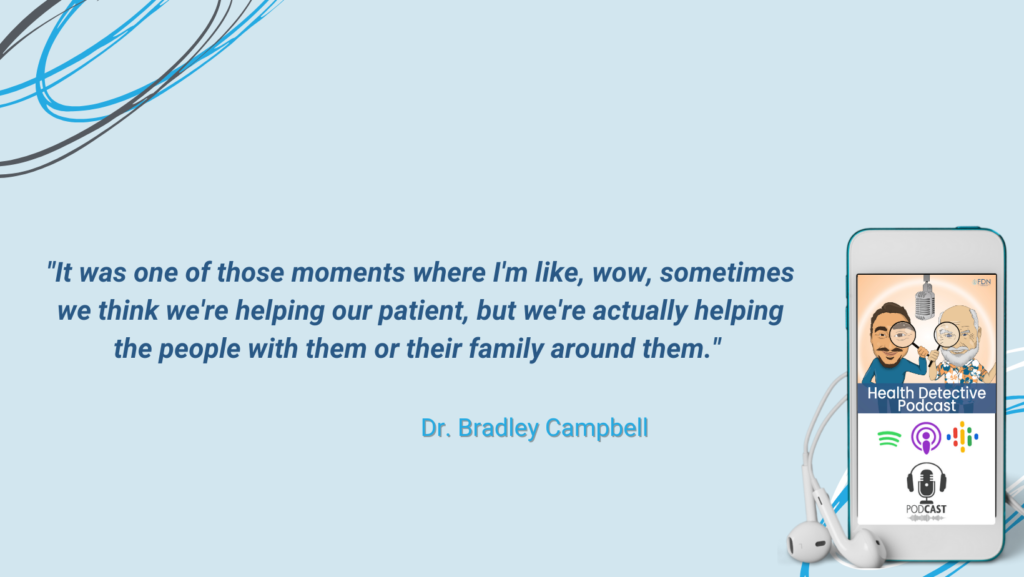
I pray to God that the daughter is safe. I actually have contacted them since and they’re in a good space cause I know some of their family. It was one of those moments where I’m like, wow, sometimes we think we’re helping our patient, but we’re actually helping the people with them or their family around them.
Even if they’re not better, that awareness will level up everybody in their sphere and that could be a complete game changer for their entire family.
Changing the Trajectory of a Daughter’s Life
[00:44:30] Detective Ev: Wow. All right. That’s a heck of a testimonial. I like that. I mean, it’s a sad story obviously originally. And I can get the embarrassment that would come, you know, especially if the daughter says that.
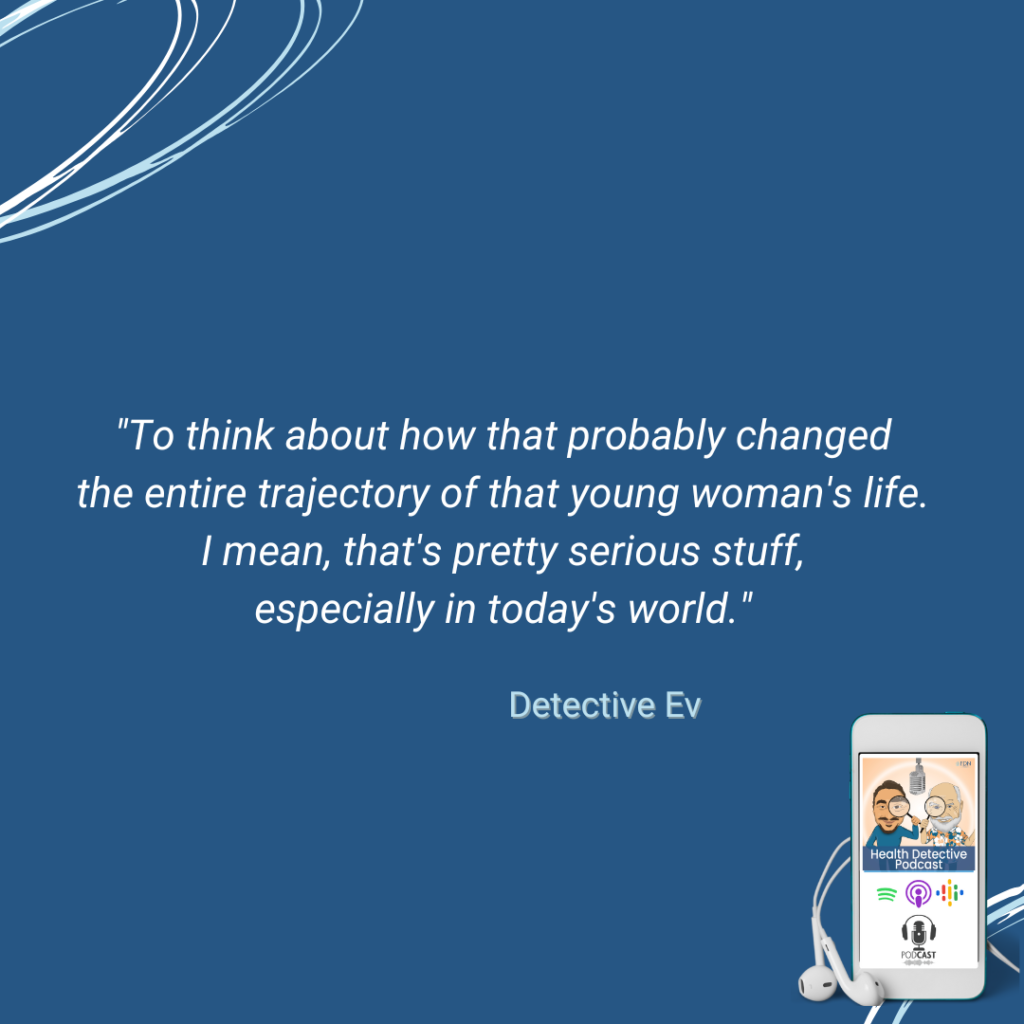
But man. So again, I mentioned in the beginning I work with kids. To think about how that probably changed the entire trajectory of that young woman’s life. I mean, that’s pretty serious stuff, especially in today’s world. There’s nothing normal about that. We know it’s not good. We know it’s not helpful. You don’t do that to kids, ideally.
So that’s amazing. In all the testimonials I ask for, I mean, you could imagine this I guess, that’s never one that has come up in even kind of. So very interesting.
Now, where can people find you? Please mention the Instagram. Guys, I don’t care if you’re a practitioner and you’re just listening for the story and you’re already doing well on your health journey, this is an Instagram you want to follow.
It is very entertaining, it’s very educational. So where can people find you on social and then in person and then where can they find the wait list? Give it all to us.
Where to Find Dr. Bradley Campbell
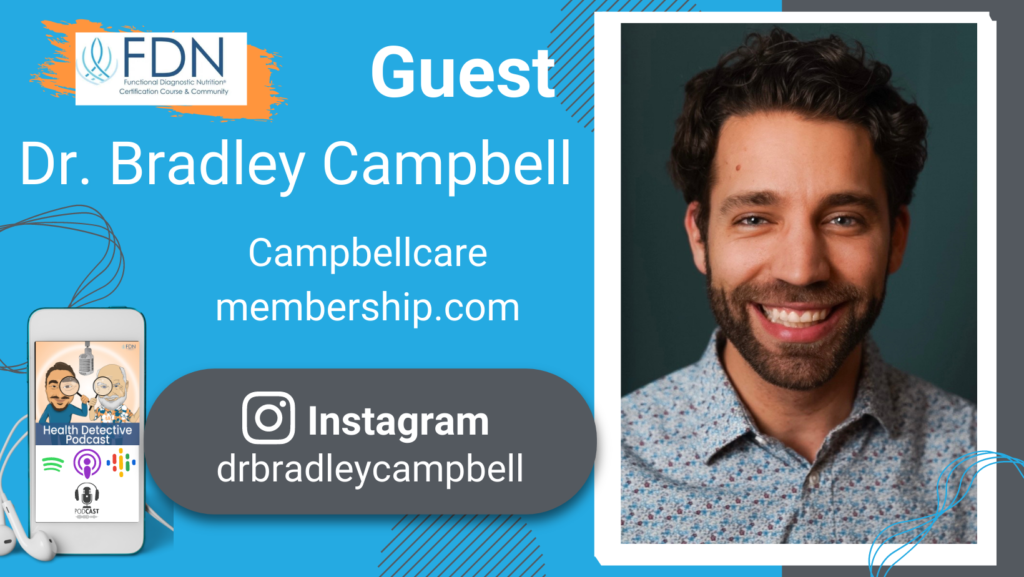
[00:45:20] Dr. Bradley Campbell: Yep. So, Instagram is Dr.CampbellCares, d r c a m p b e l l c a r e s. Dr. Campbell Cares. And on there there’s a link in the bio that has links to YouTube and Telegram and some other channels we’re on.
And our Campbell Care membership. The website for that, is campbellcaremembership.com. We have courses that are a fraction of the price of super expensive courses, on thyroid, on gut dysbiosis, on some comprehensive foundations of health and weekly Q&A calls and things like that.
We have a membership there. We have a podcast that’s coming out in January that’s going to be on our website and on the Instagram. We’ll have information there for people.
Then I have a book as well called Do I Have Adrenal Fatigue, which is on Amazon for purchase too.
[00:46:05] Detective Ev: Cool. All right.
Health Detective Podcast Signature Question
I want to finish up with the signature question on the Health Detective Podcast. It’s always fun interviewing someone who’s so well versed because you never know where they’re going to go with this one.
But the question I have for you to finish up is if I could give you, in this case, a magic wand and you could wave it, you get every single person in this world to do one thing for their health. So that could be you actually got them to start one thing, or you could get everyone to stop doing one thing. What is the one thing Dr. Campbell would get them to do?
[00:46:32] Dr. Bradley Campbell: I would get them to stop doing their drugs every day and start doing them with more intention. That includes caffeine, alcohol, marijuana unless they’re prescribed a drug.
I think most people are over consuming drugs on a daily basis, and that’s leaving them not truly authentic to who they are. They’re covering up a lot of their physical and emotional health problems with waking up early with caffeine in the morning or using alcohol or marijuana to go to bed.
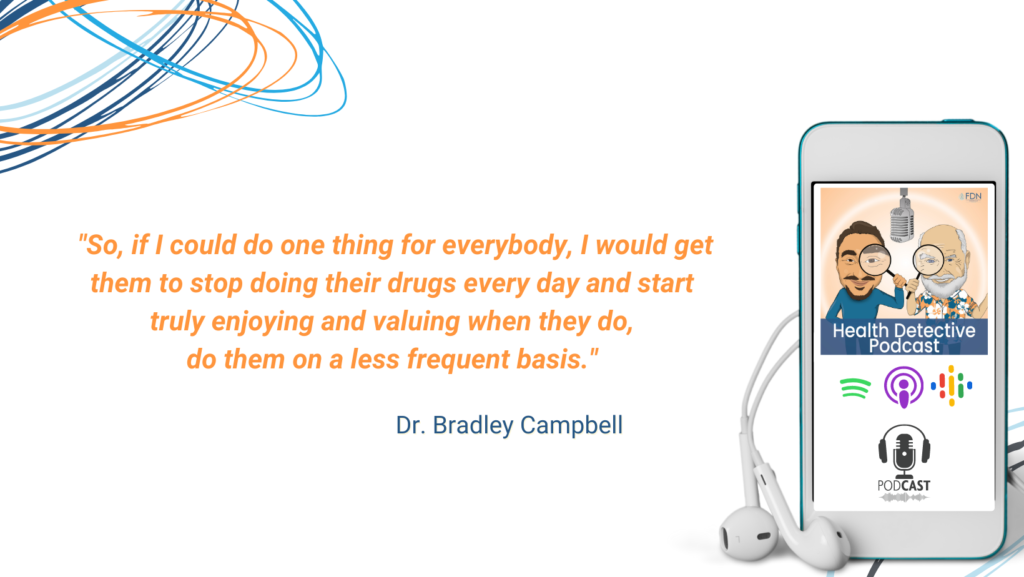
It leads to a perpetual state of stress and then eventual burnout. Then that leads to a plethora of health issues. So, if I could do one thing for everybody, I would get them to stop doing their drugs every day and start truly enjoying and valuing when they do, do them on a less frequent basis.
[00:47:18] Detective Ev: Not bad. 180 something episodes and no one has ever given that one. So, thank you for the fresh material. We appreciate it. And thanks for just coming all with me today. Thanks for having me.
Conclusion
All right, guys. That’ll do it for today’s episode with Dr. Bradley Campbell. I hope you guys enjoyed this one. It was pretty cool.
We ended up touching on a lot of different topics. If you listen regularly, you know, I love the conversational style of interviewing. That’s because you have some predictability to it, but there’s a lot of novelty in the conversation since you really don’t know which way it’s going to go.
Dr. Campbell and I touched on probably four or five major topics, so I hope you guys did enjoy this. Please go give him a follow. He is someone actually delivering value consistently on Instagram and other social media platforms.
Then finally, if you’re considering maybe doing work like myself, other FDN practitioners, or Dr. Campbell, but you don’t have the time to go to Naturopathic Medicine School, you might want to consider the FDN course. How you can check the FDN course out for free, is by going to fdntraining.com/tryfdn. That’s fdntraining.com/tryfdn.
It’ll let you try the course completely for free. No credit card is required.
I will be back soon with yet another interview. But until then, please take care.
You can always visit us at functionaldiagnosticnutrition.com.
If you’d like to hire a coach, go to fdnthrive.com.
For a FREE Health Review, go to fdnthrive.com/match/.

